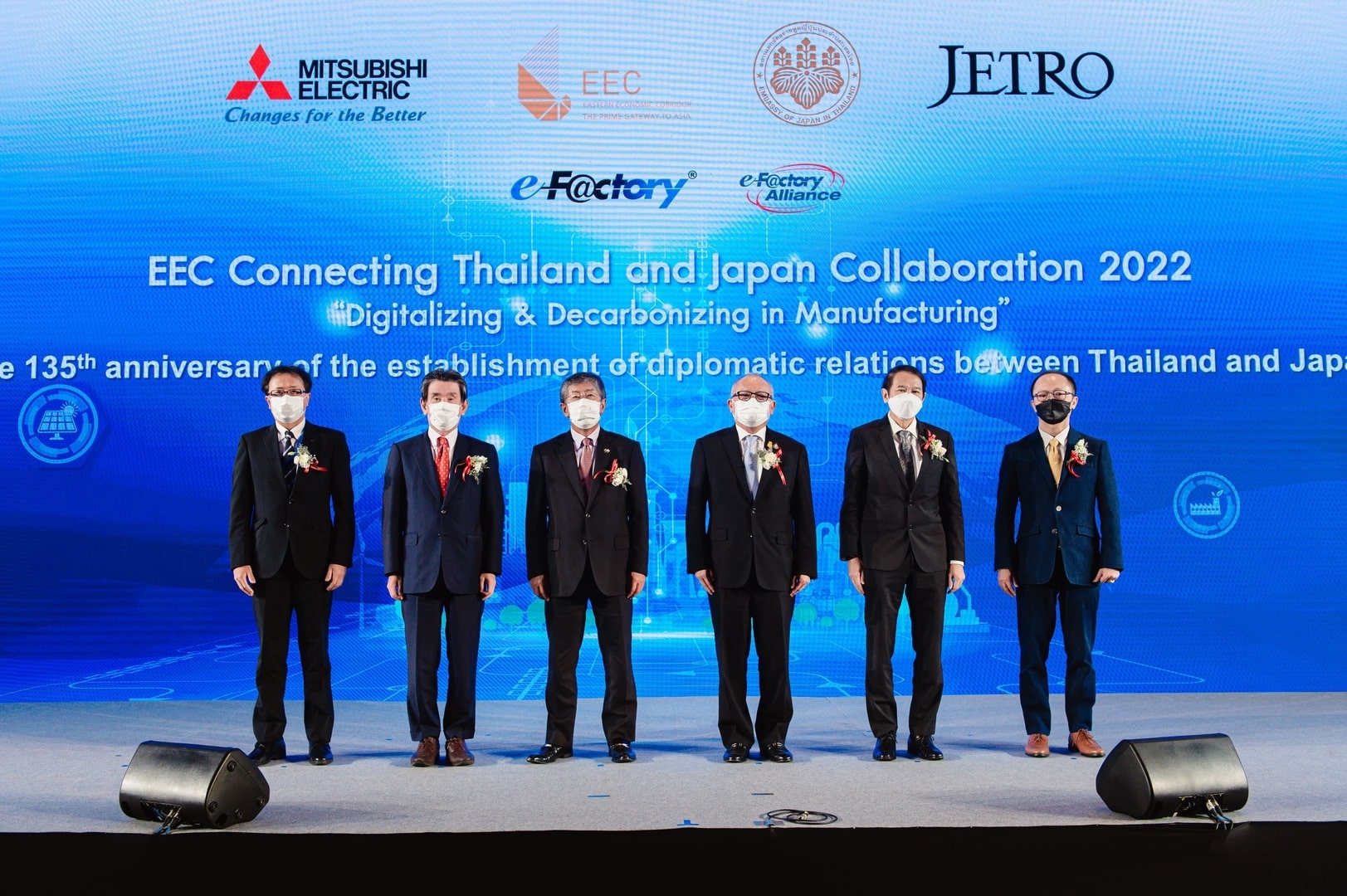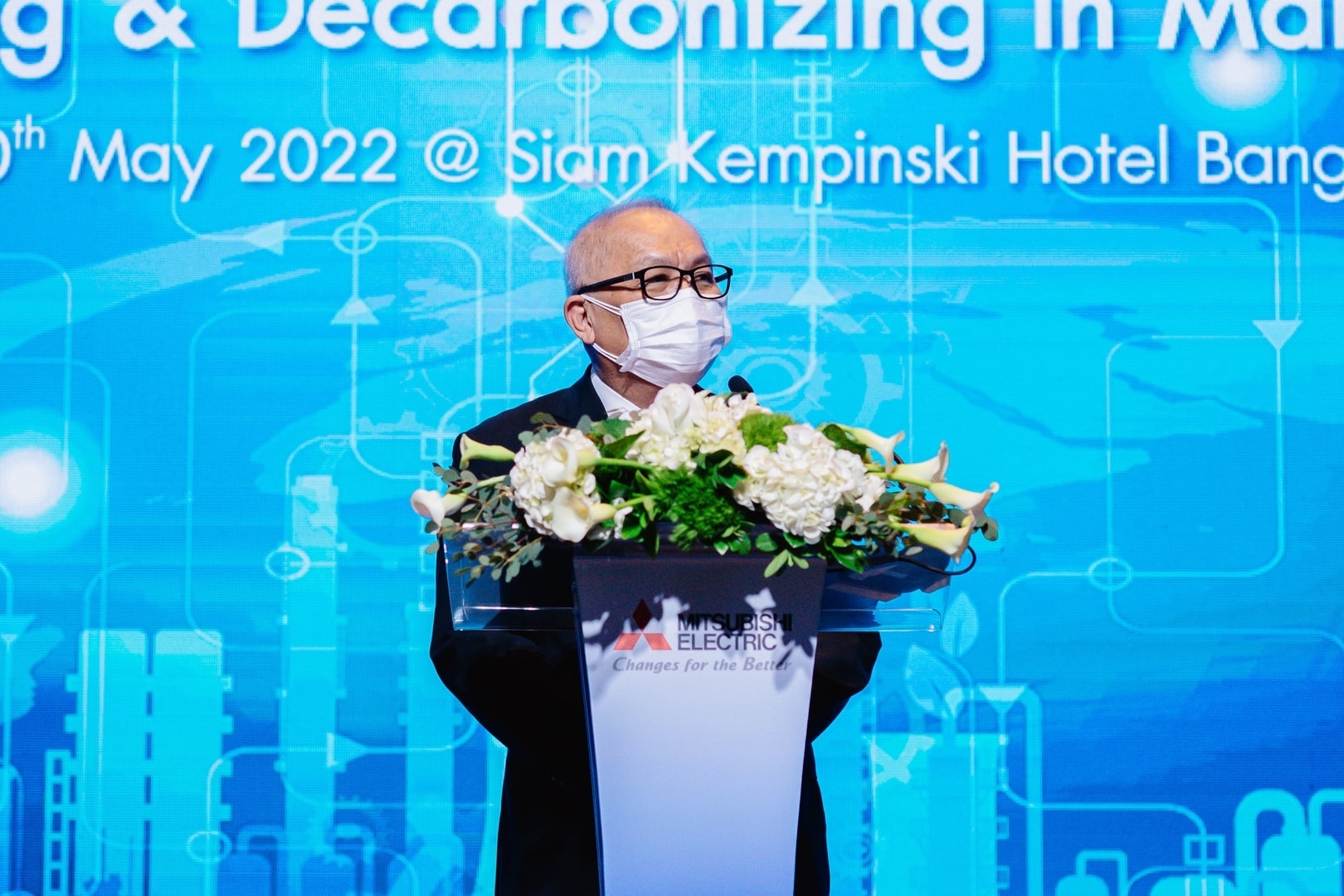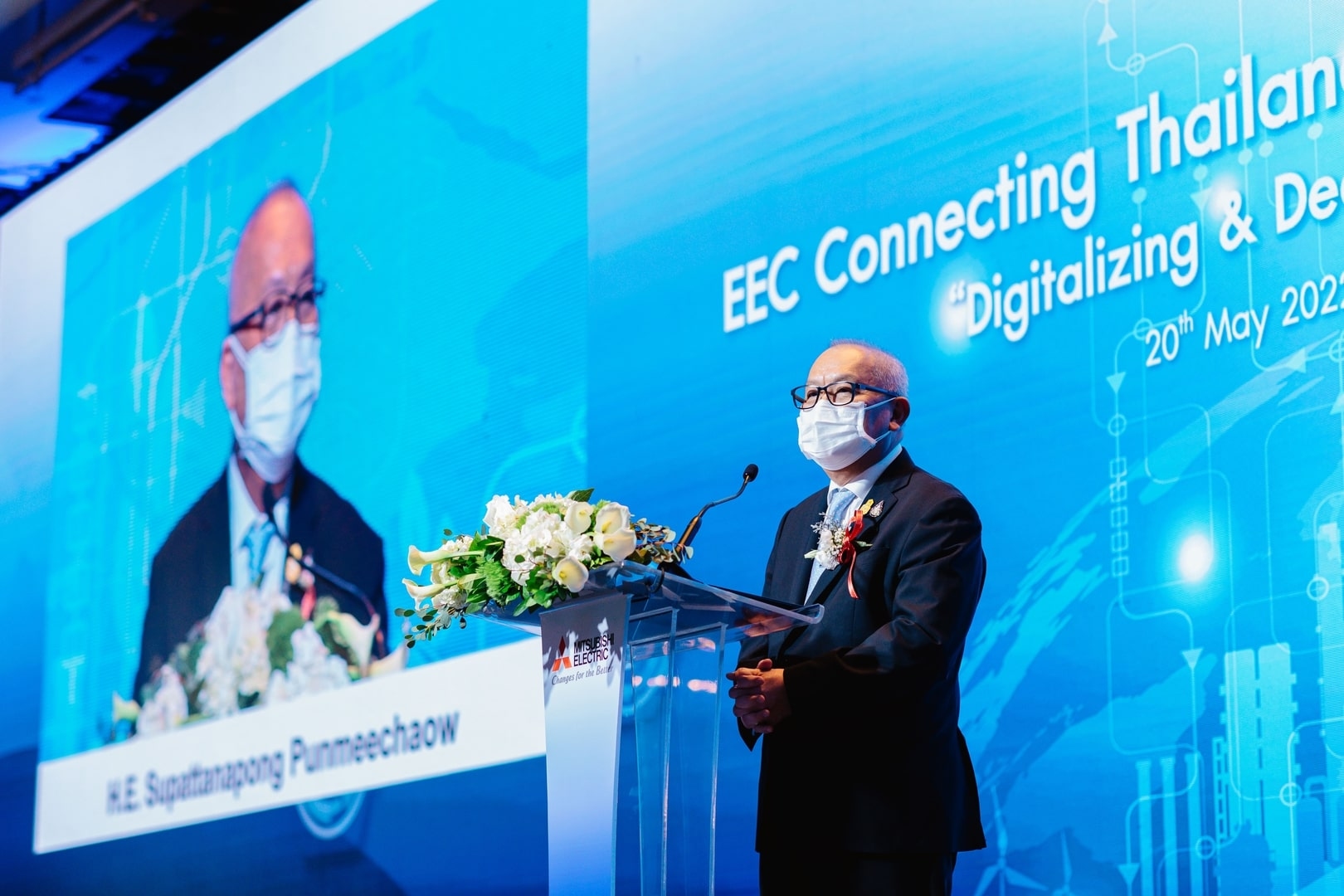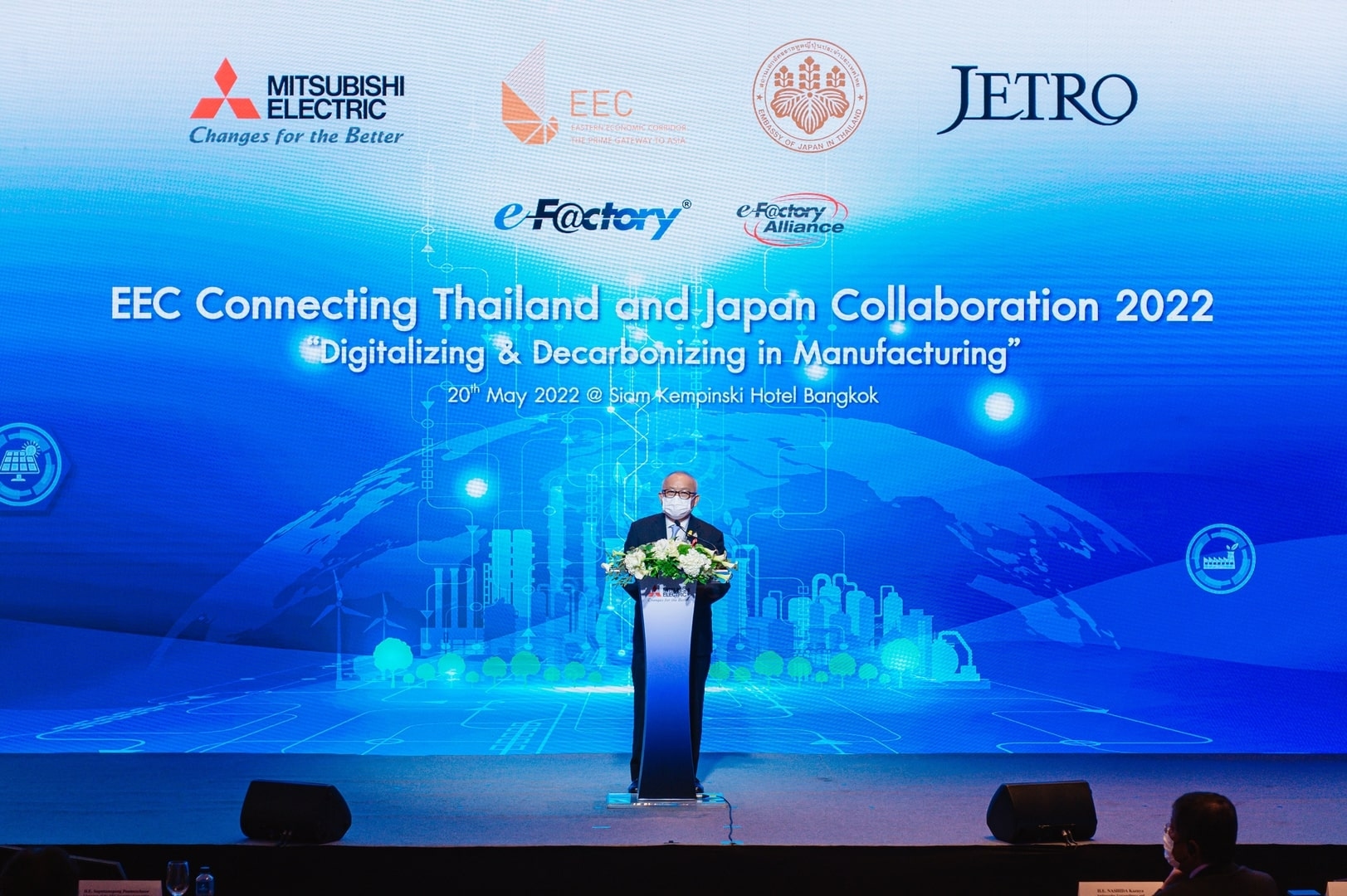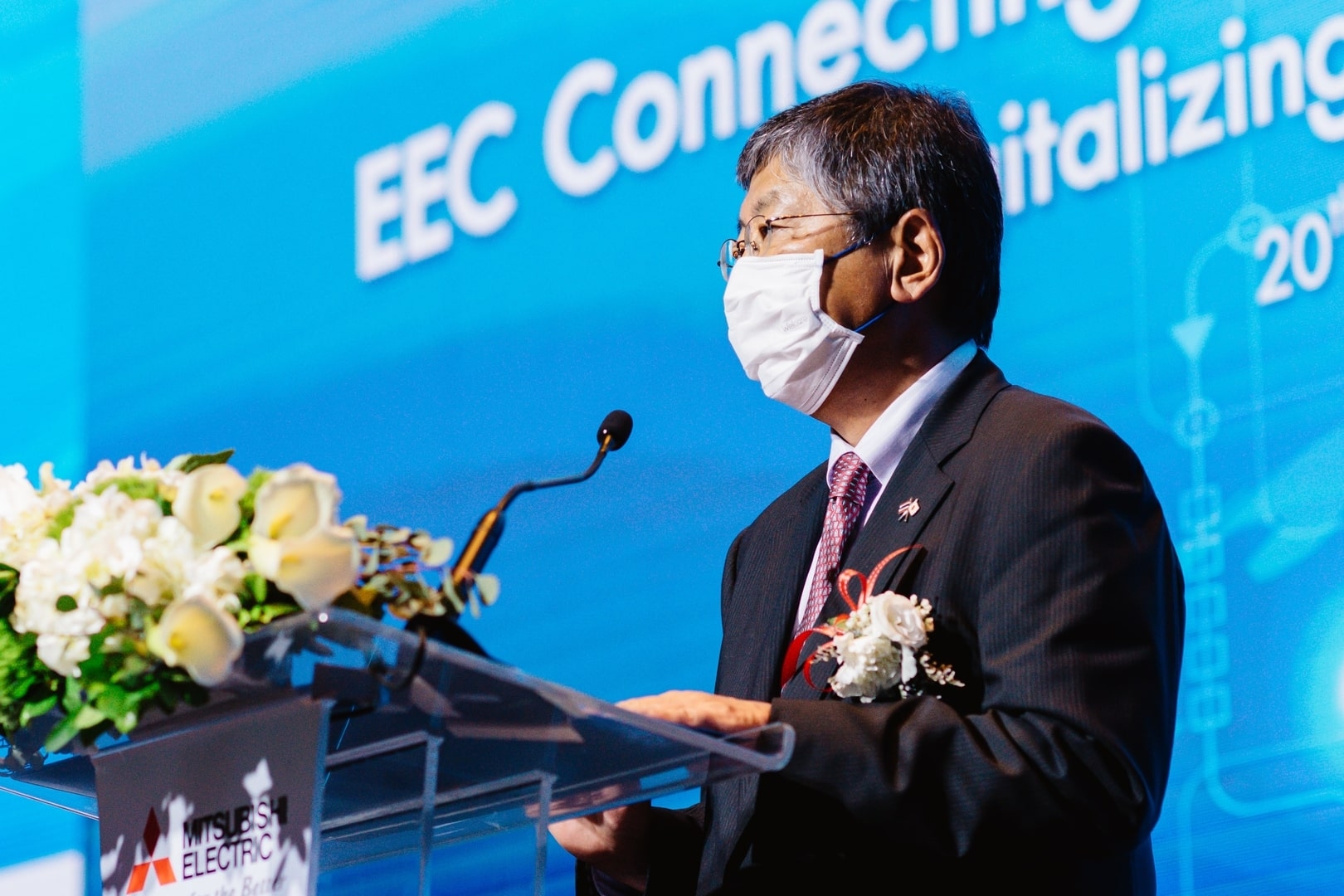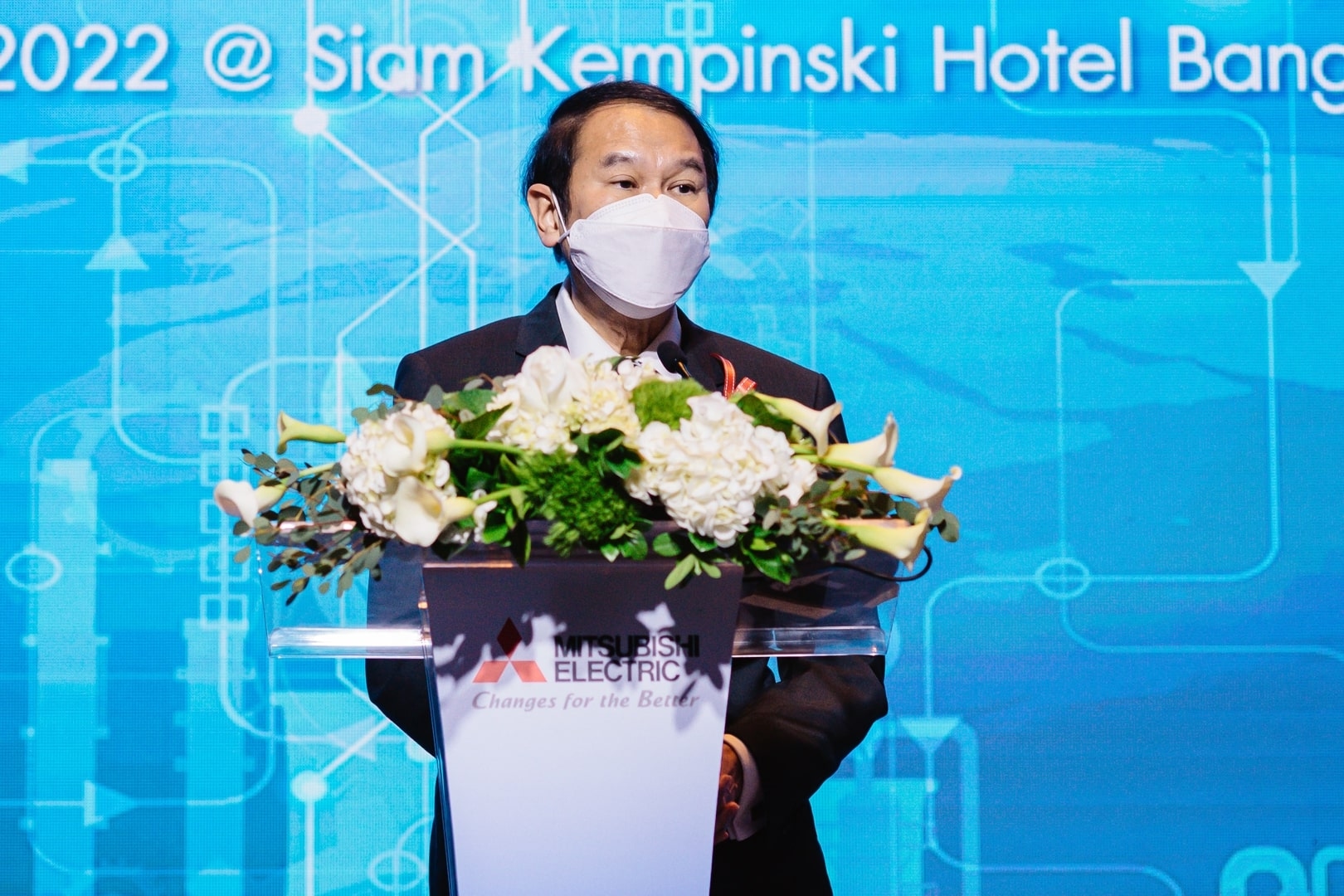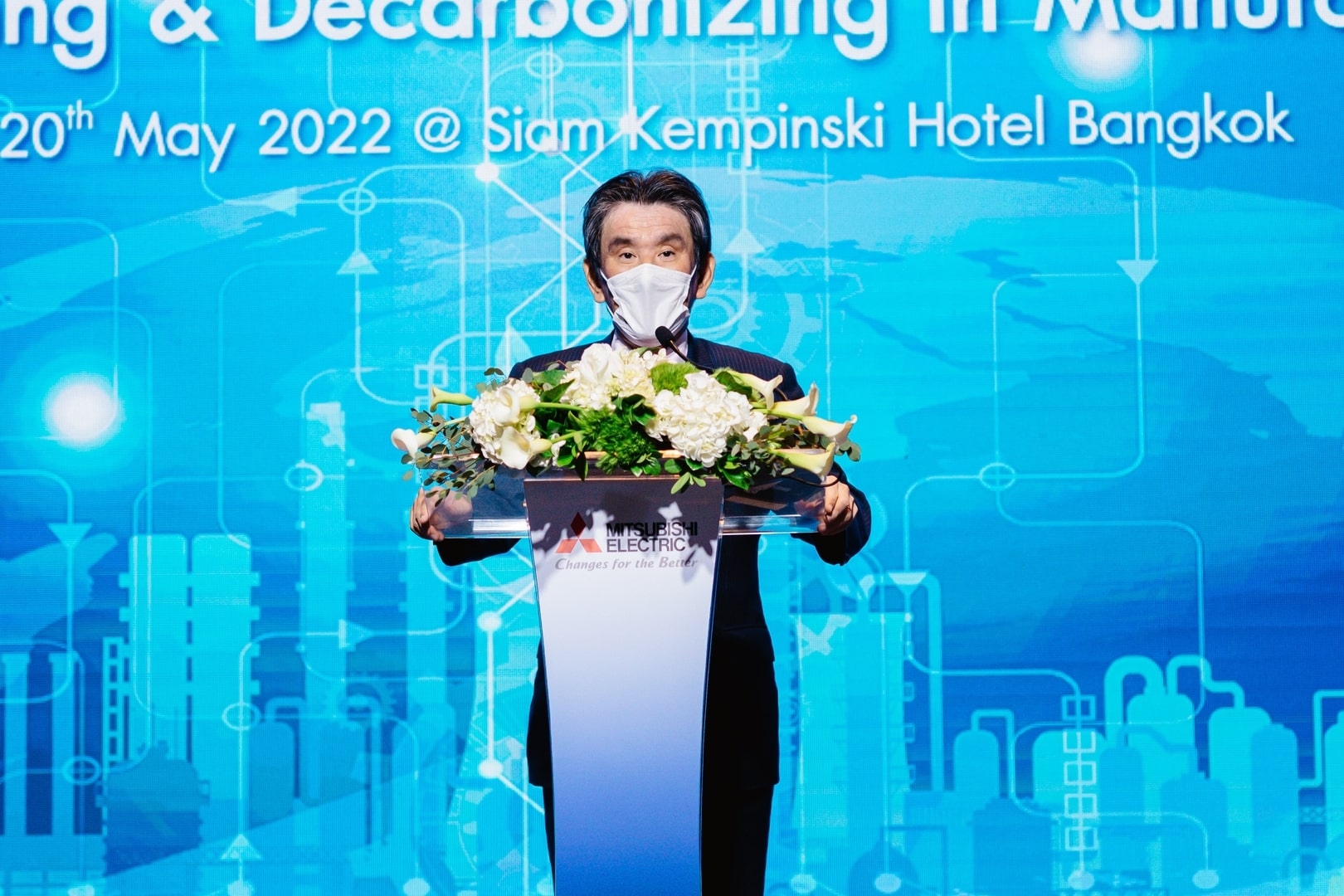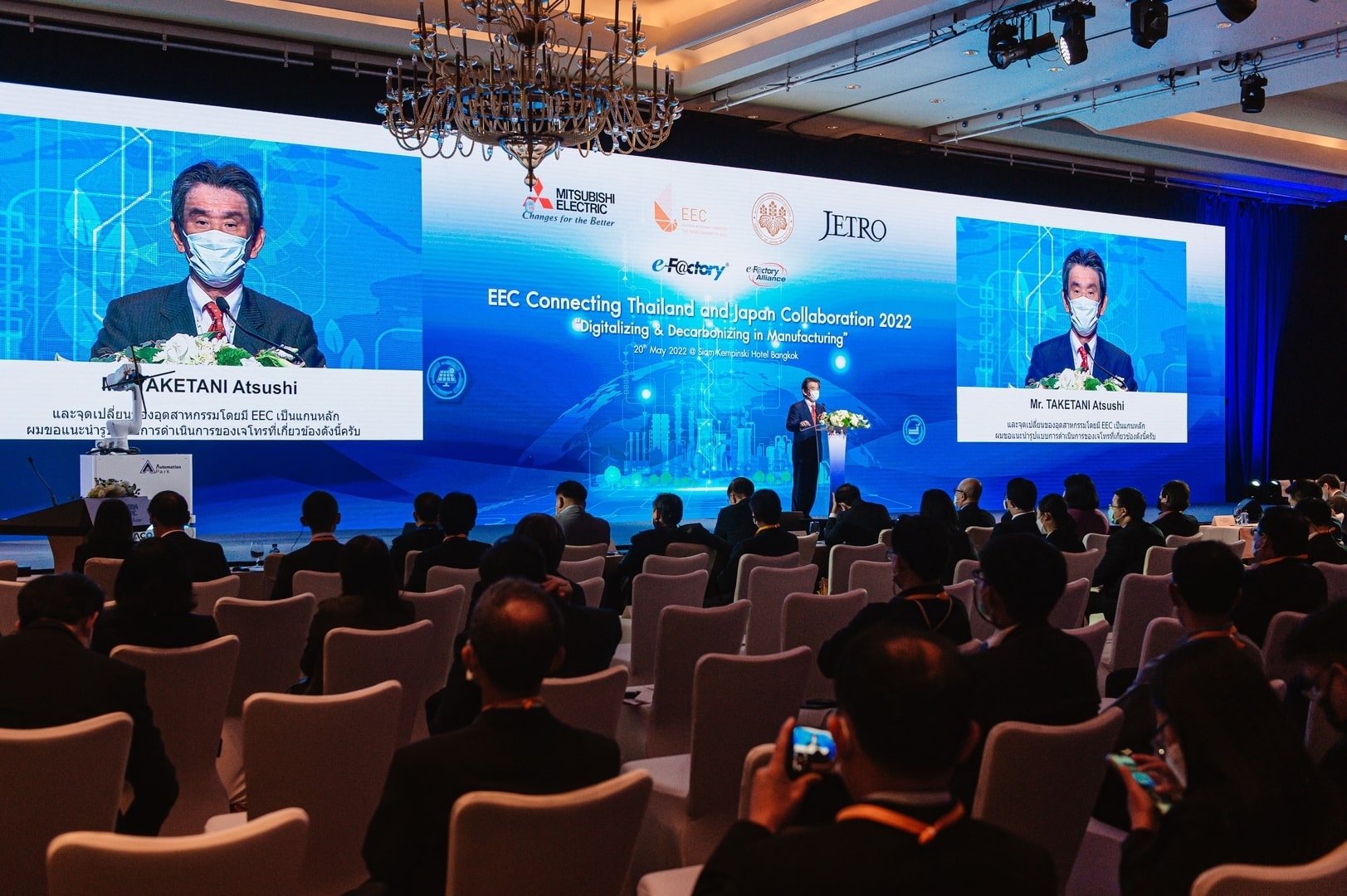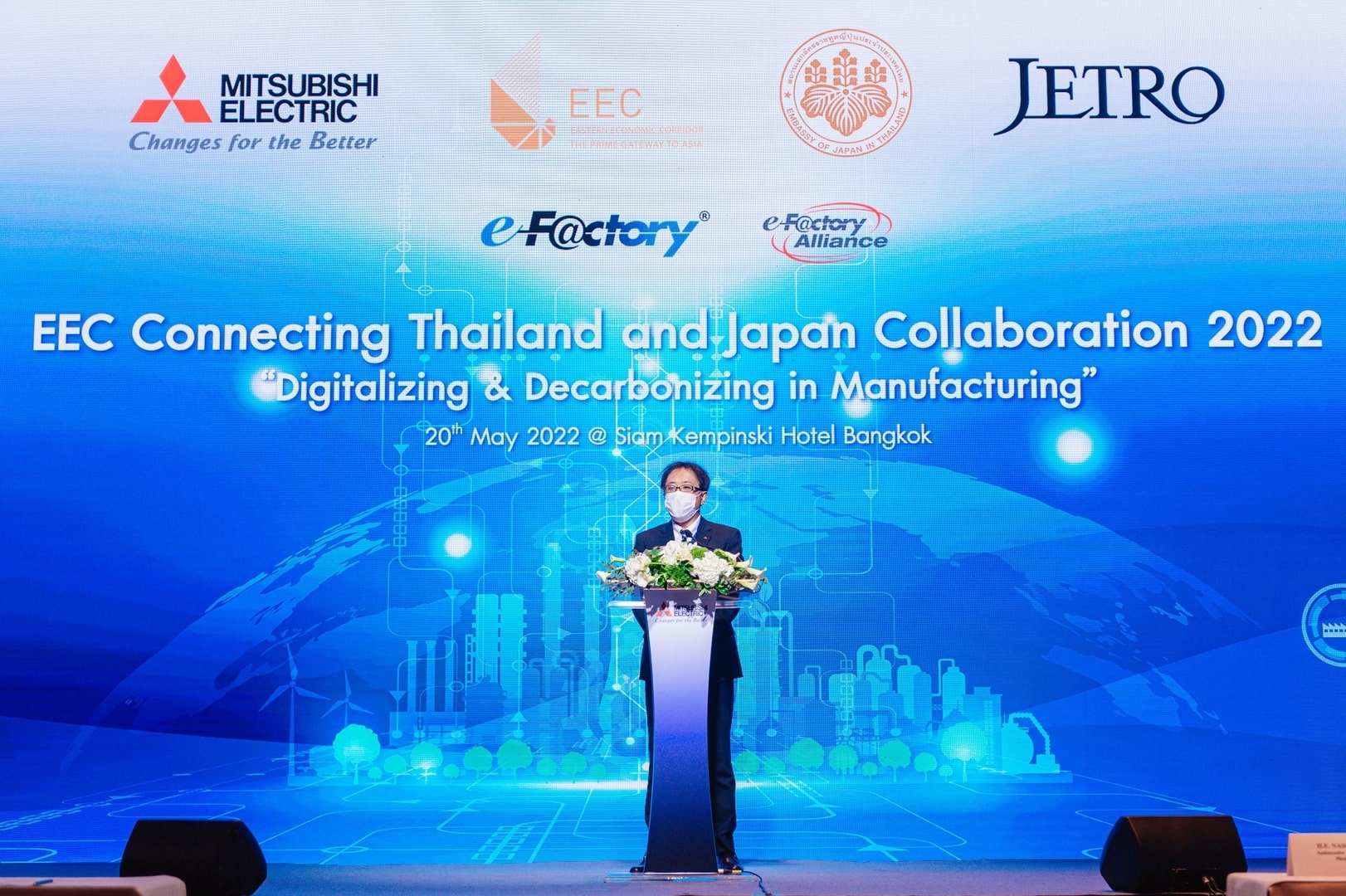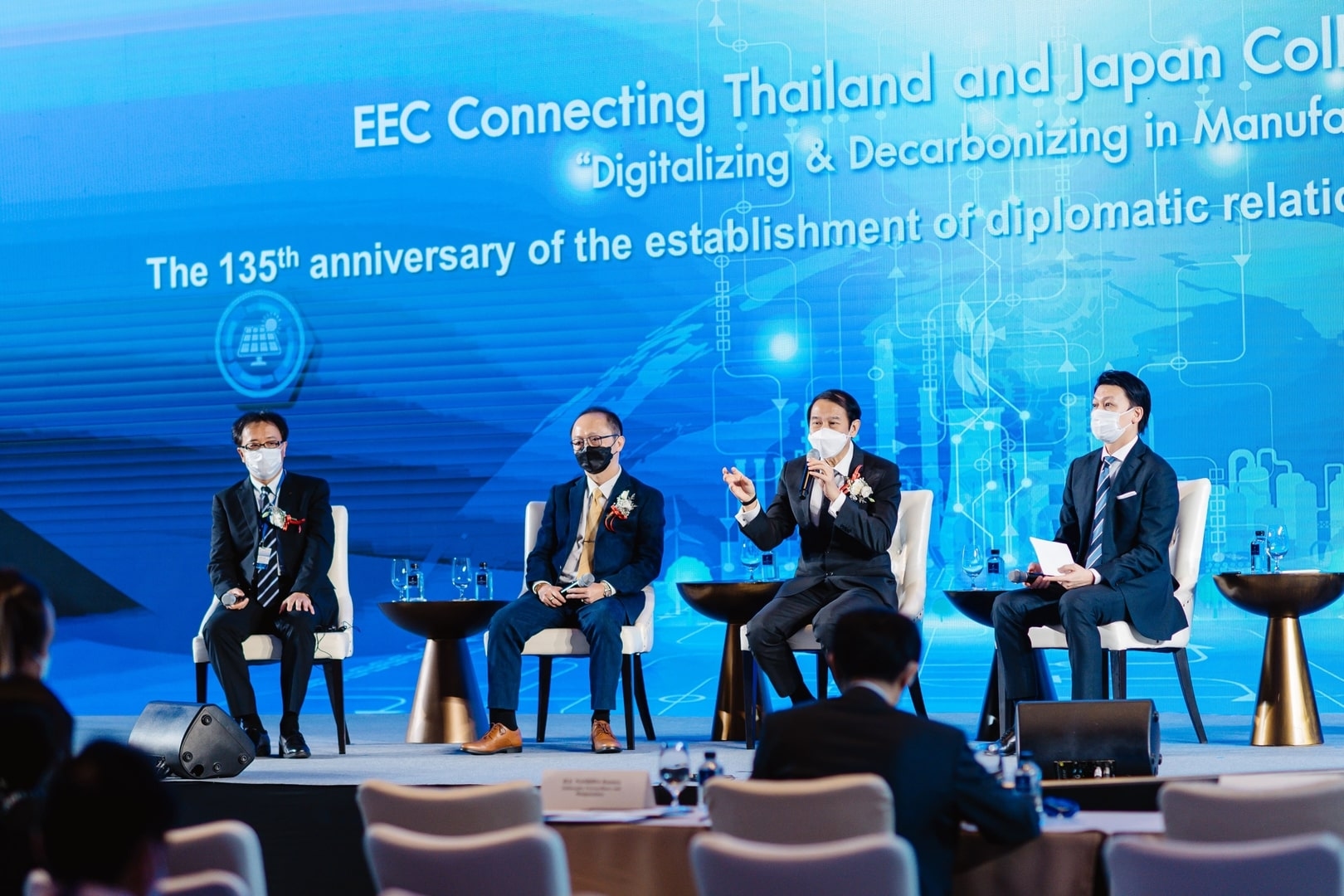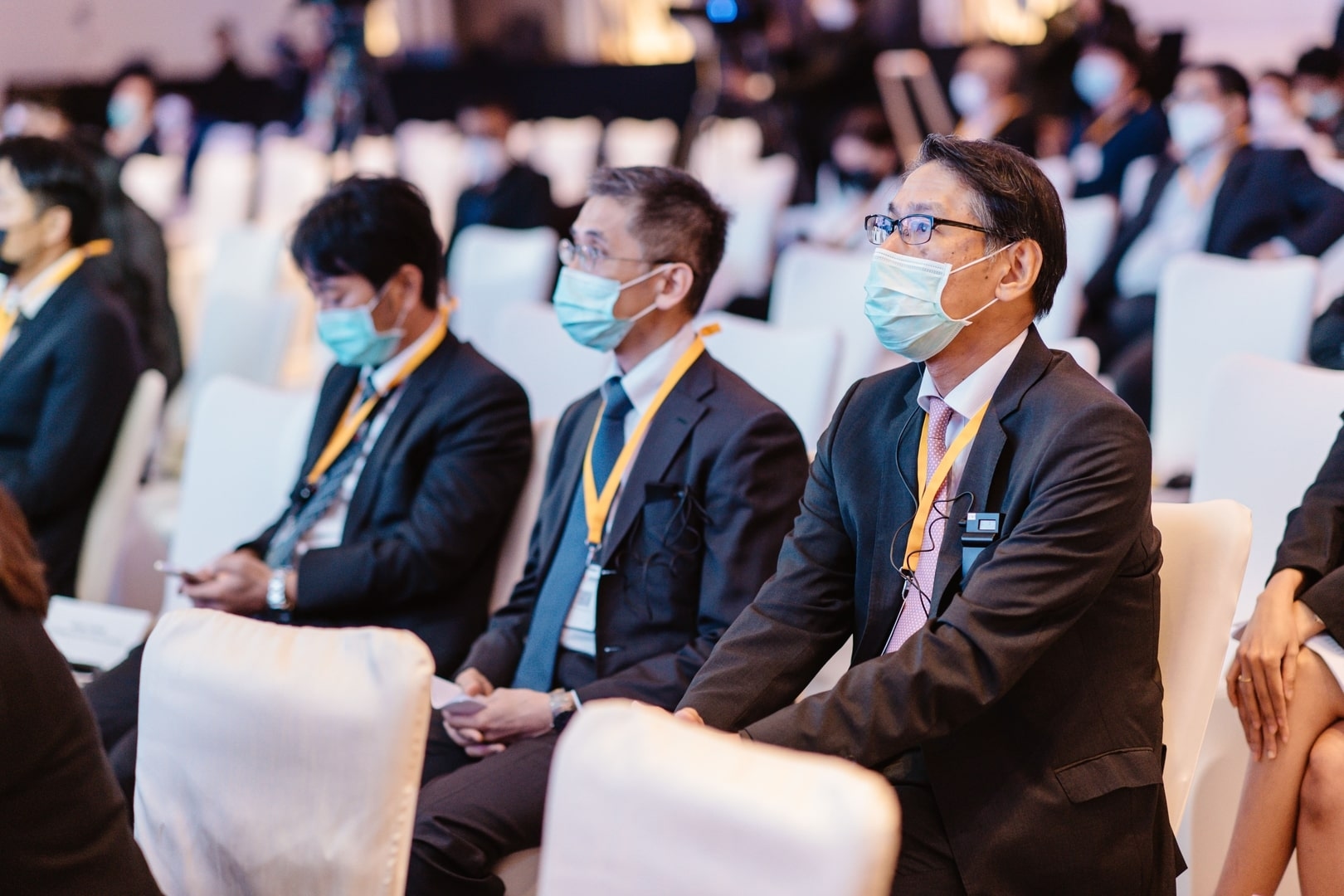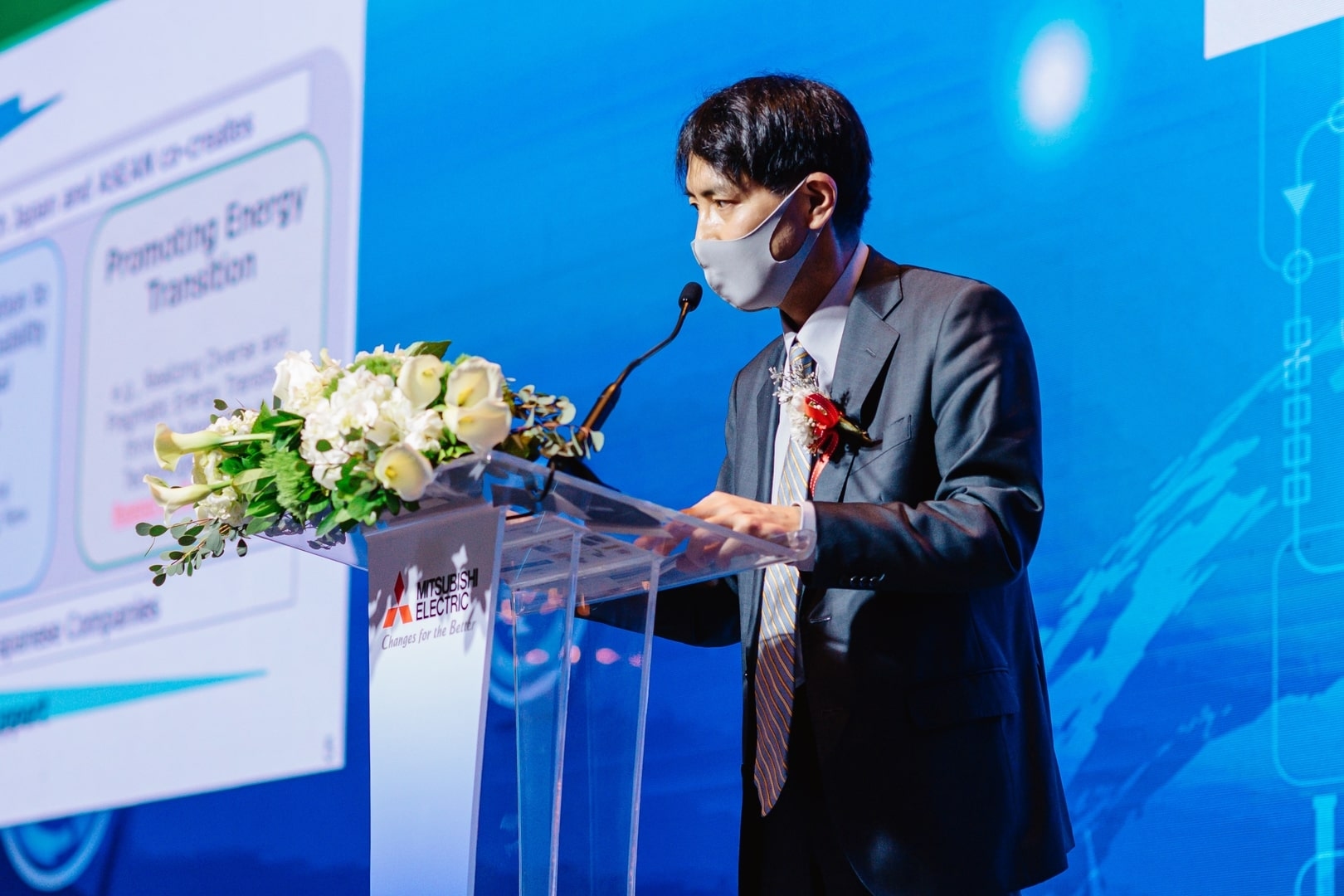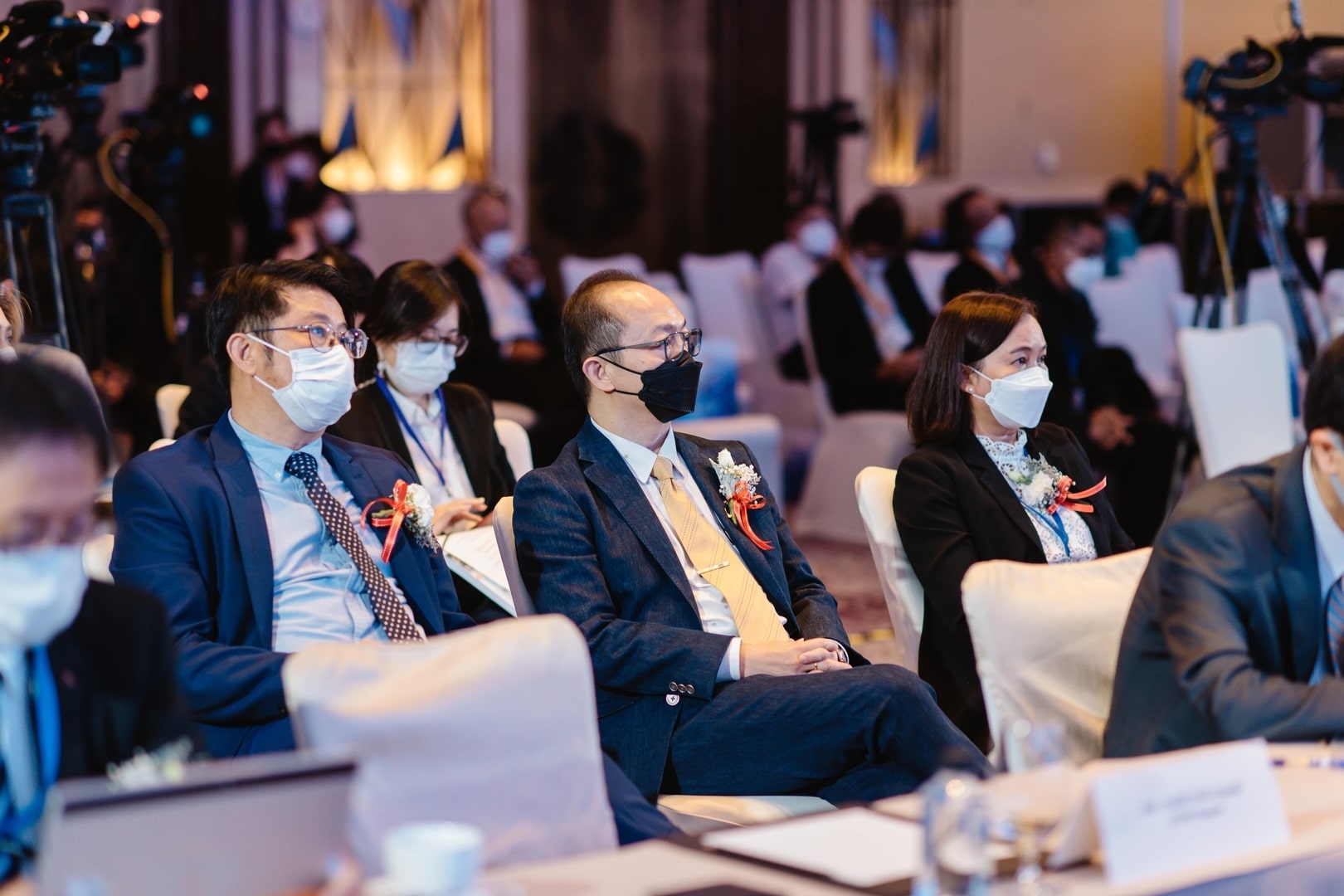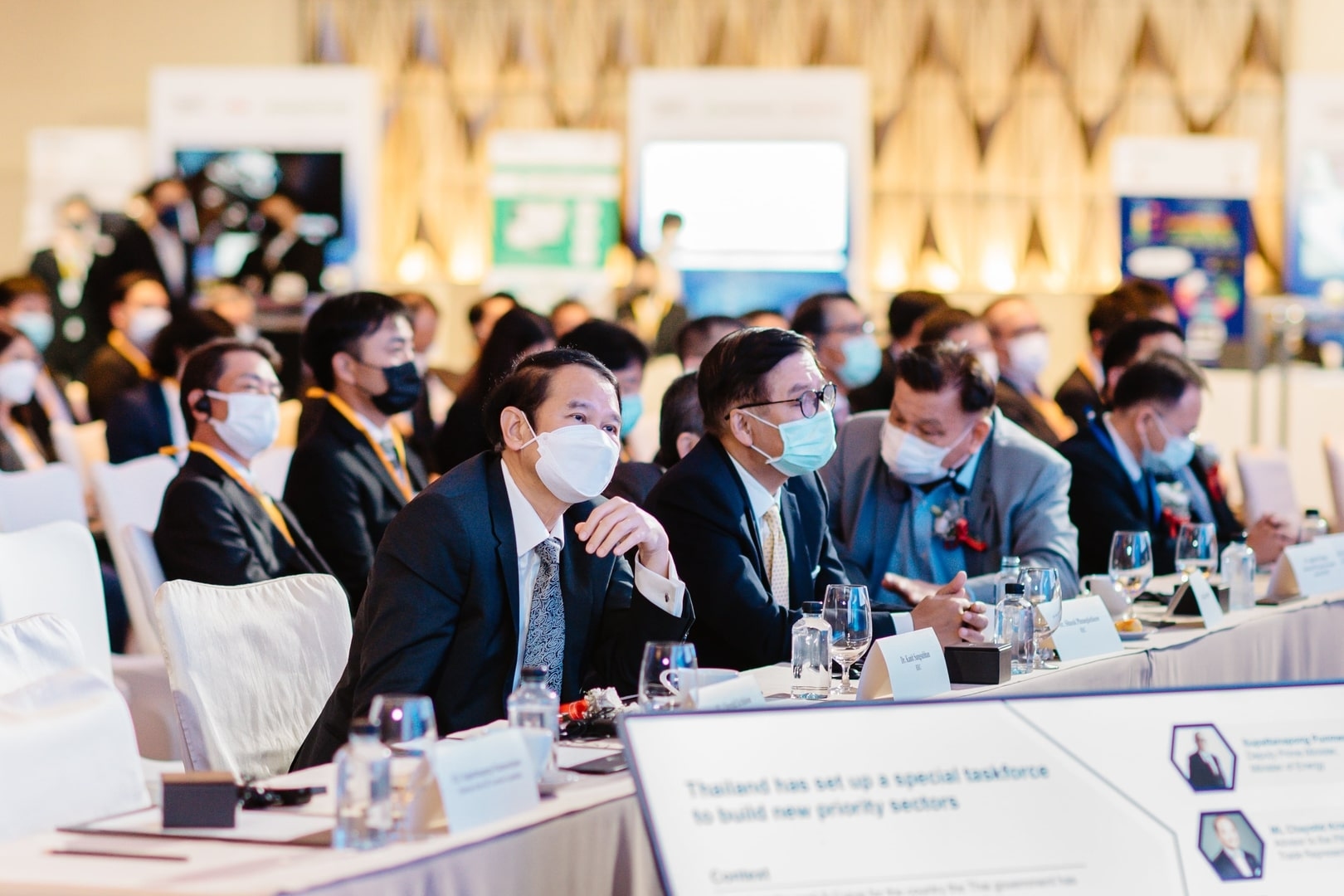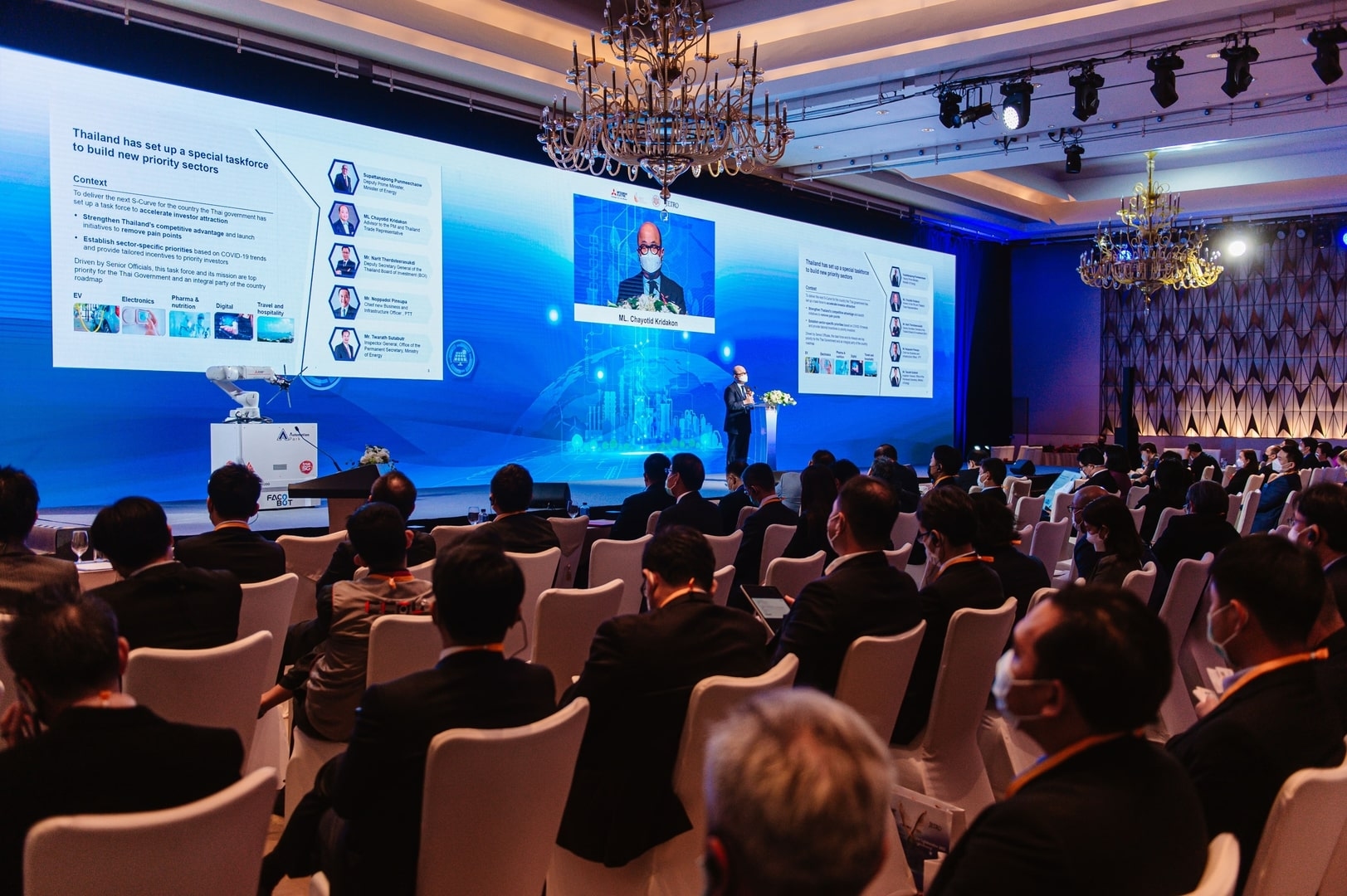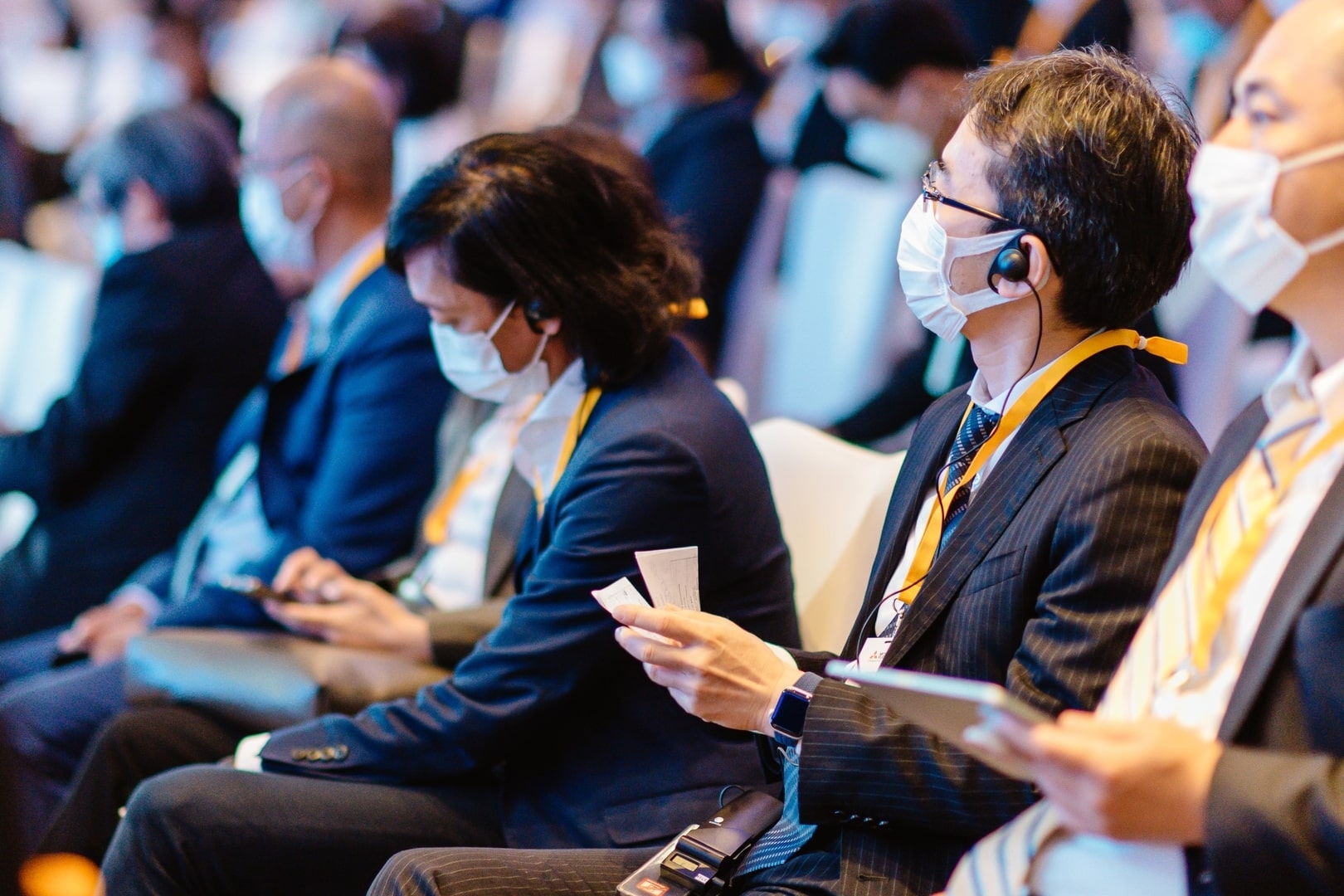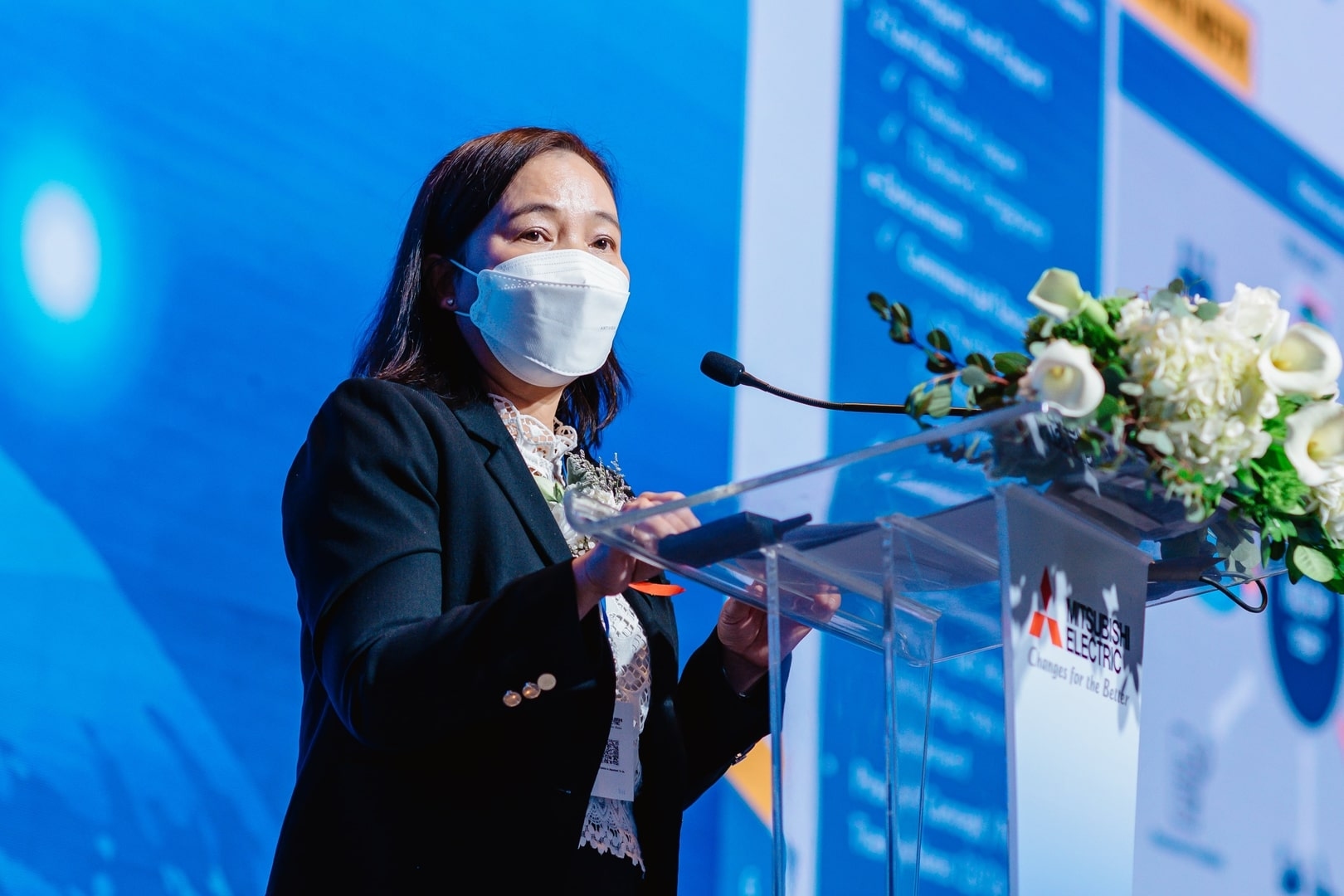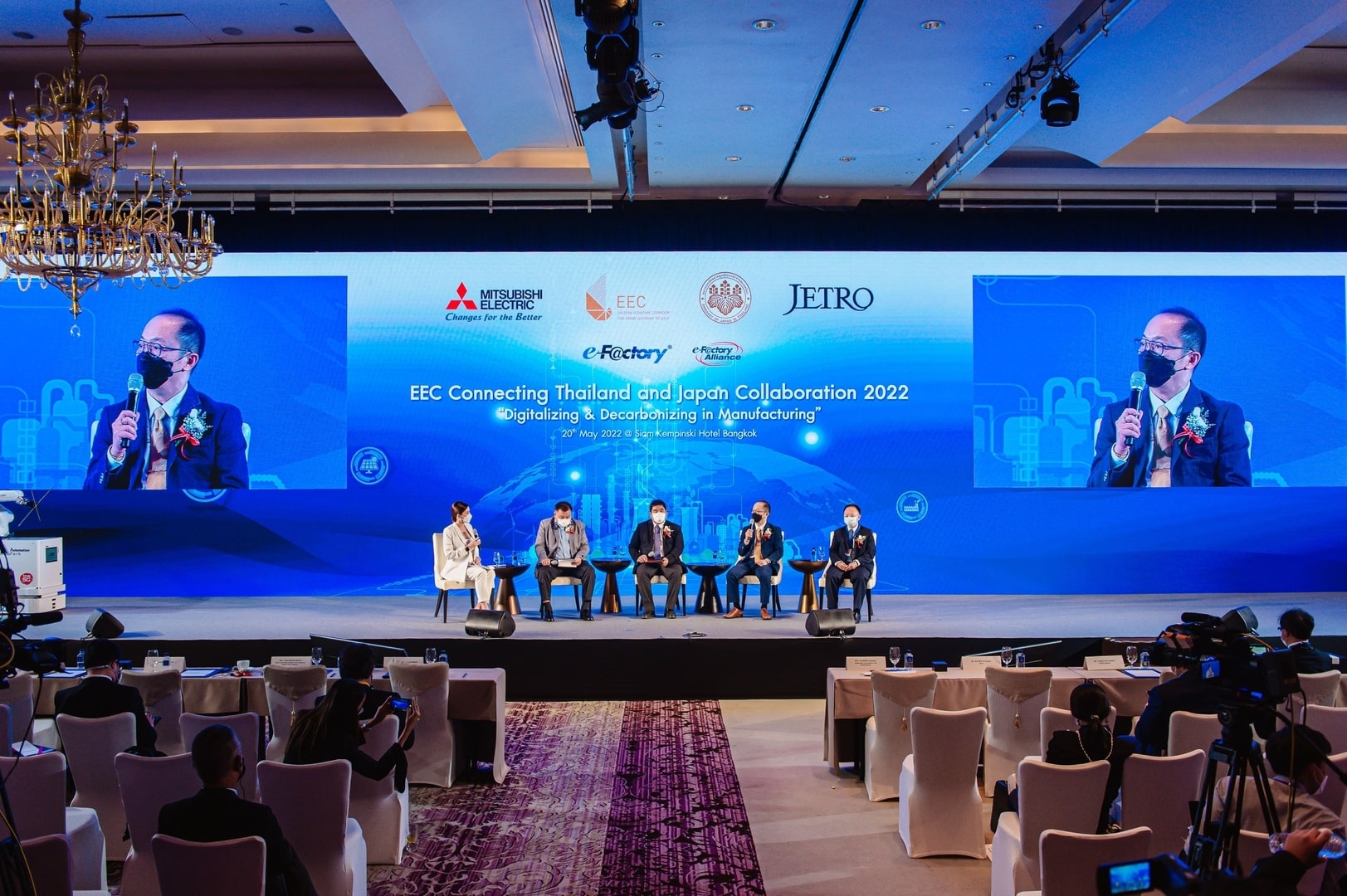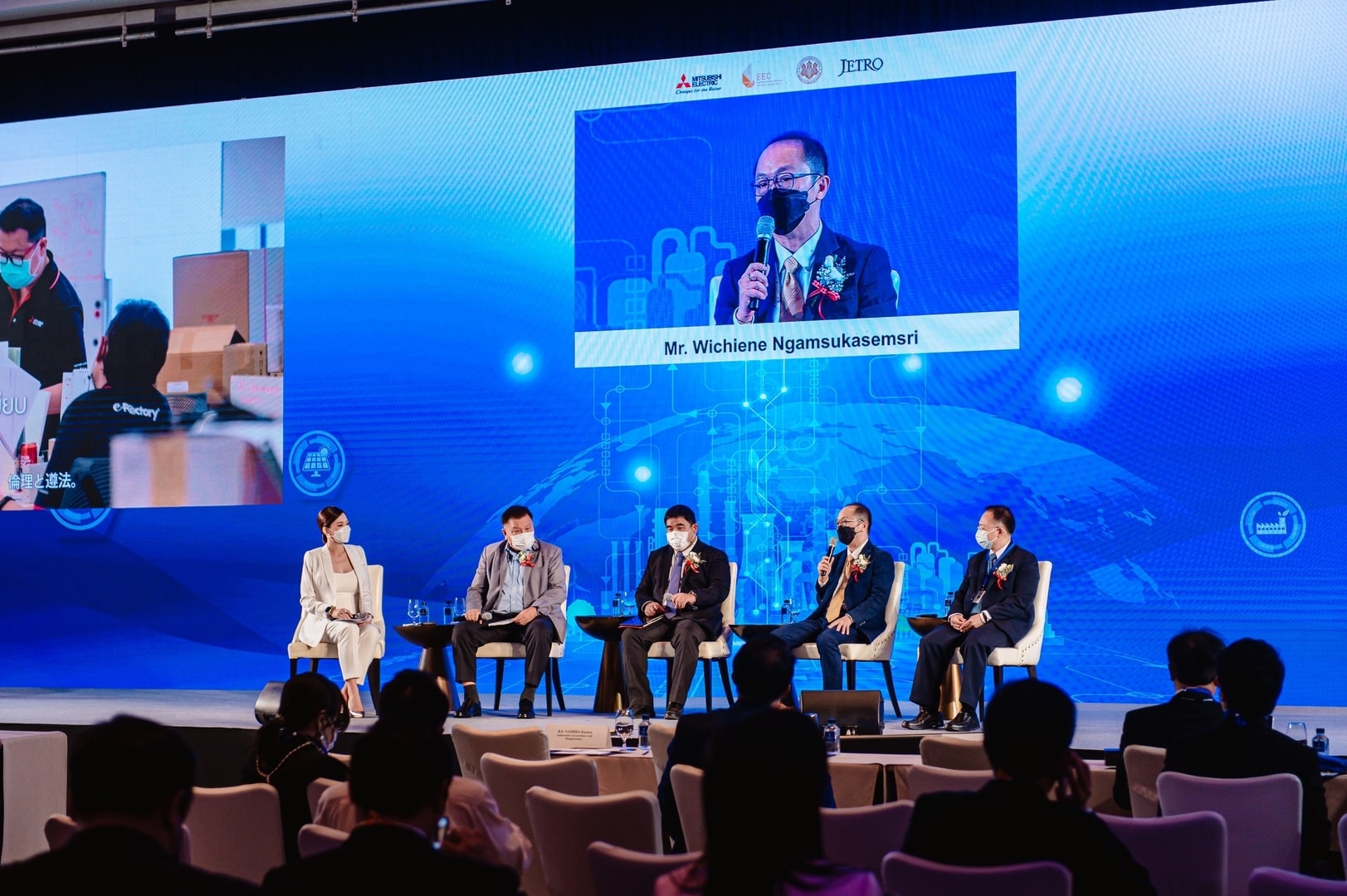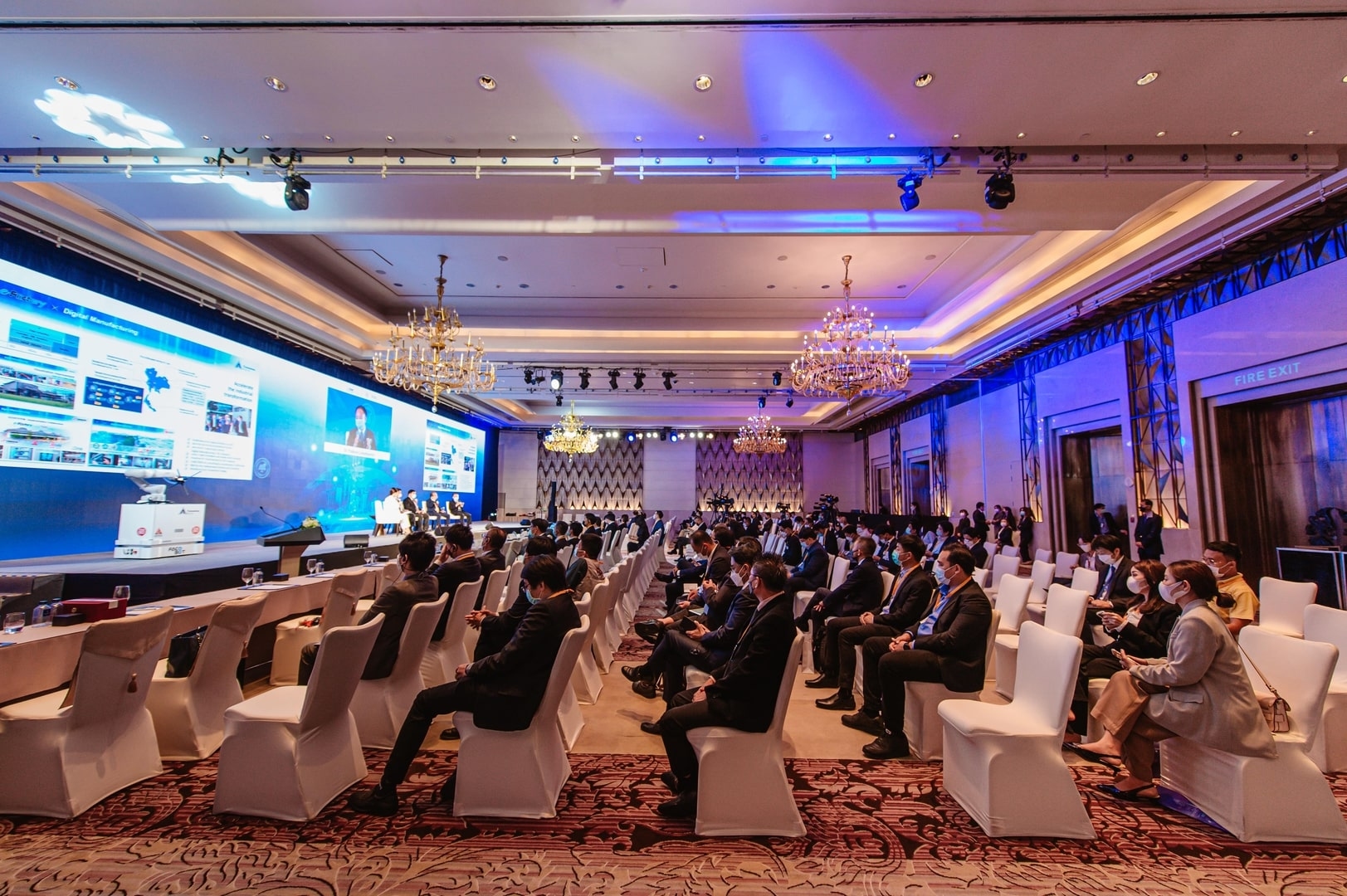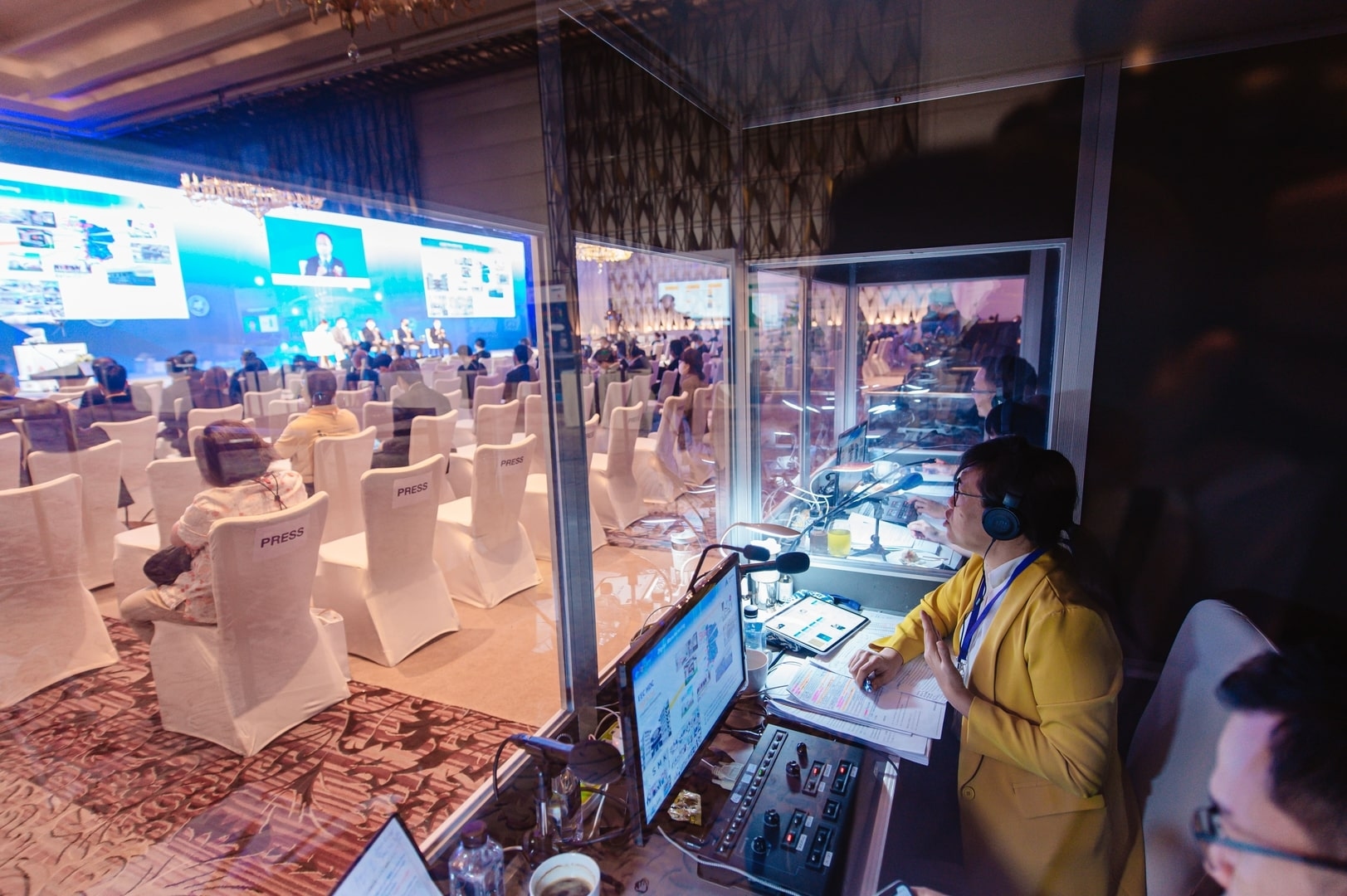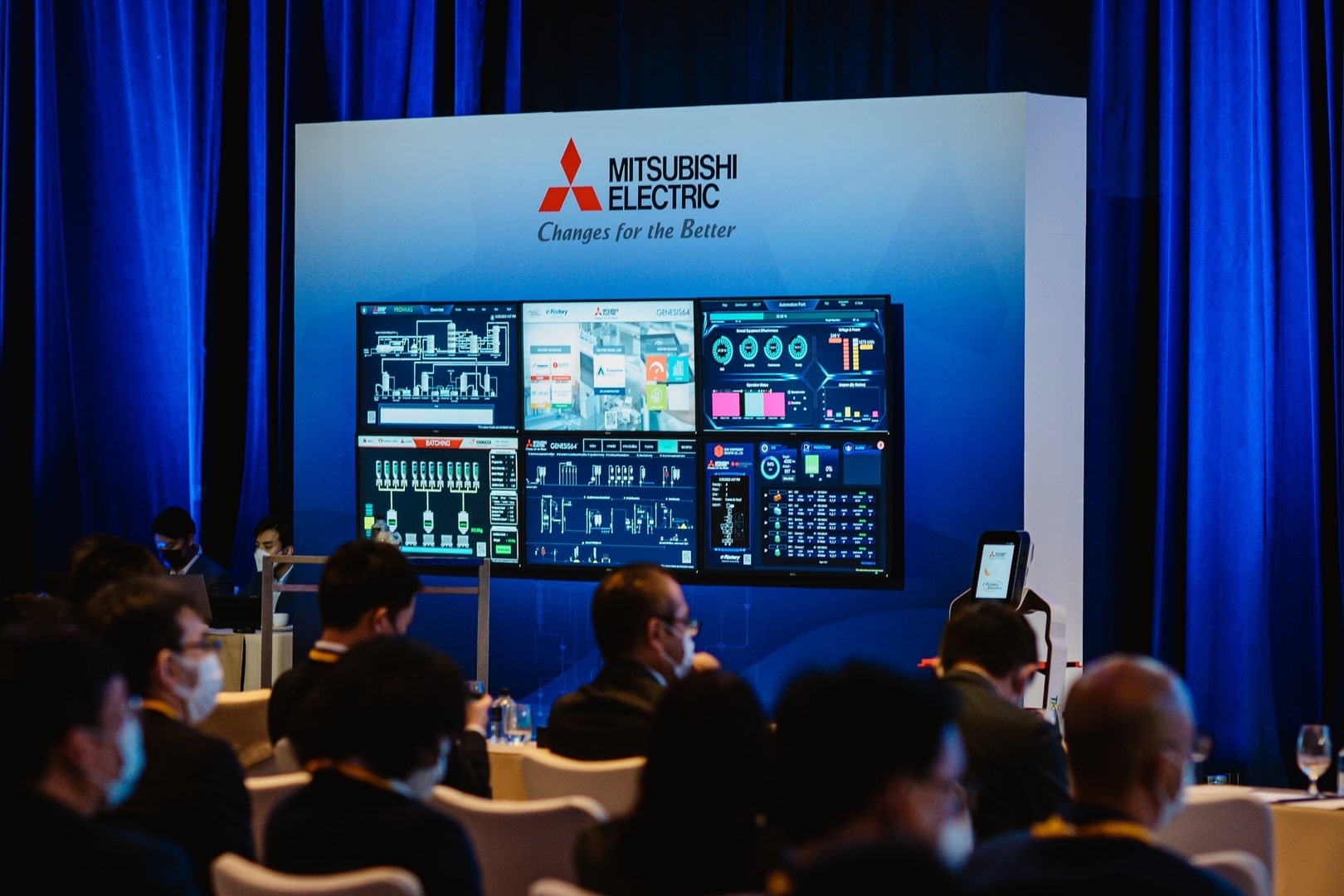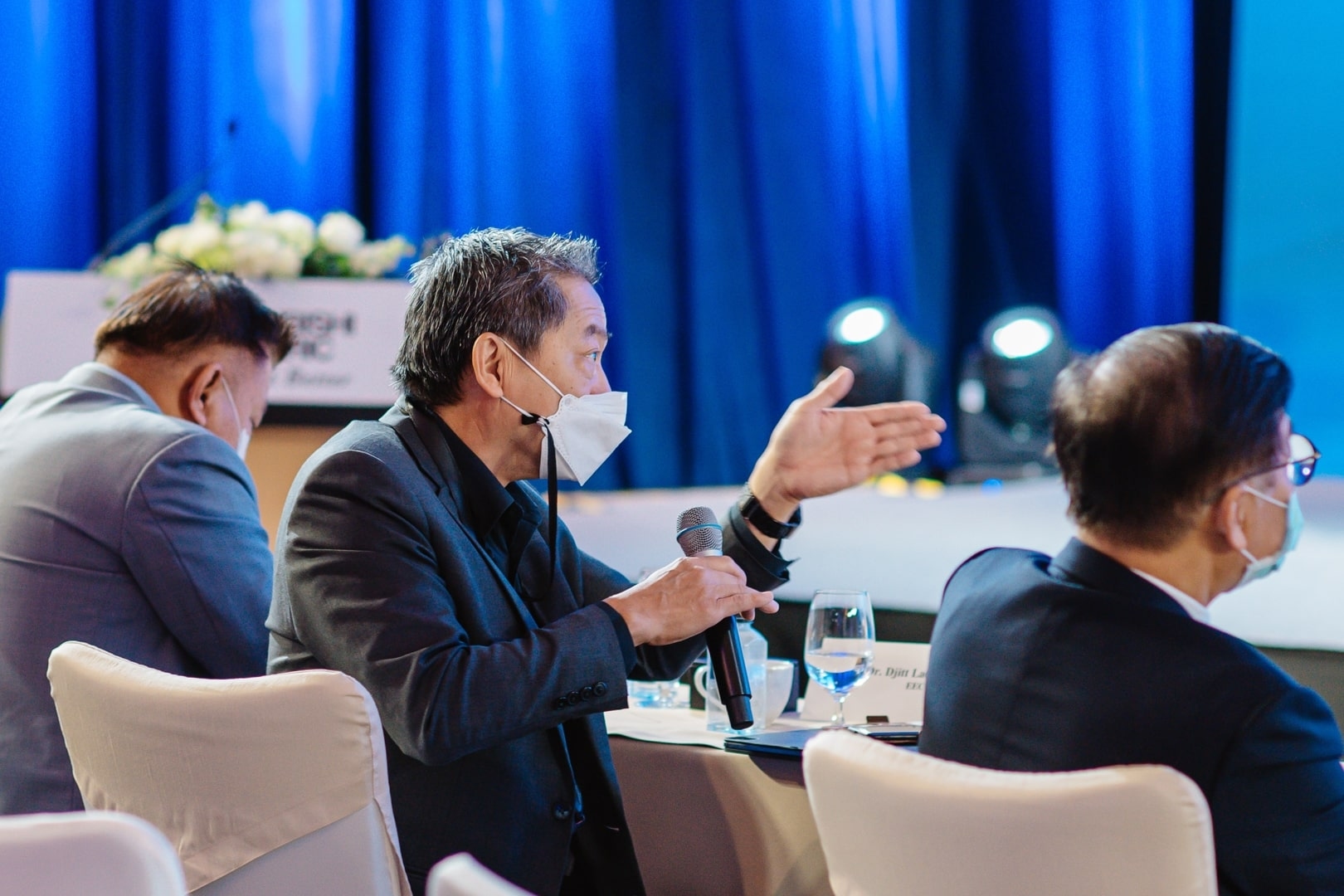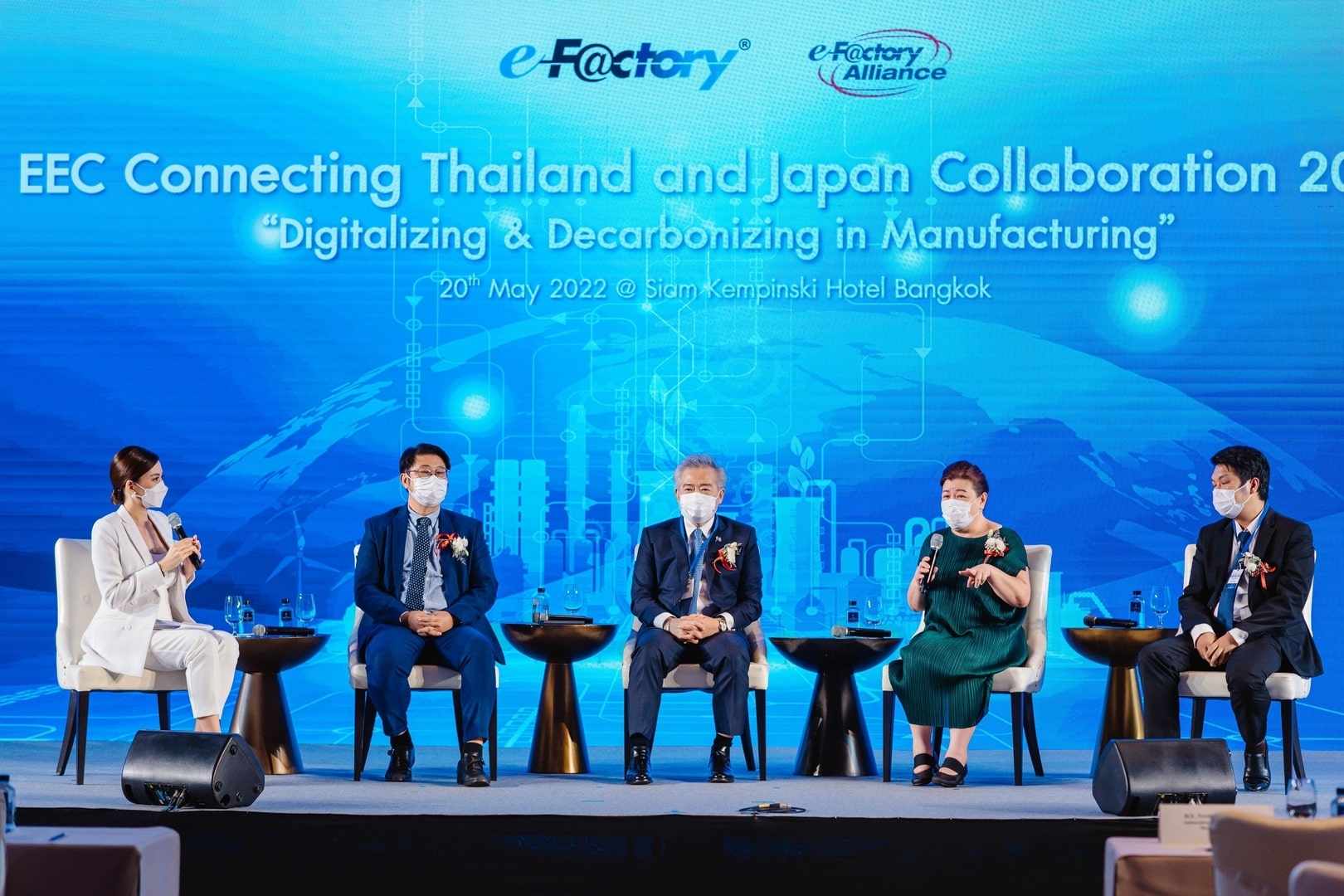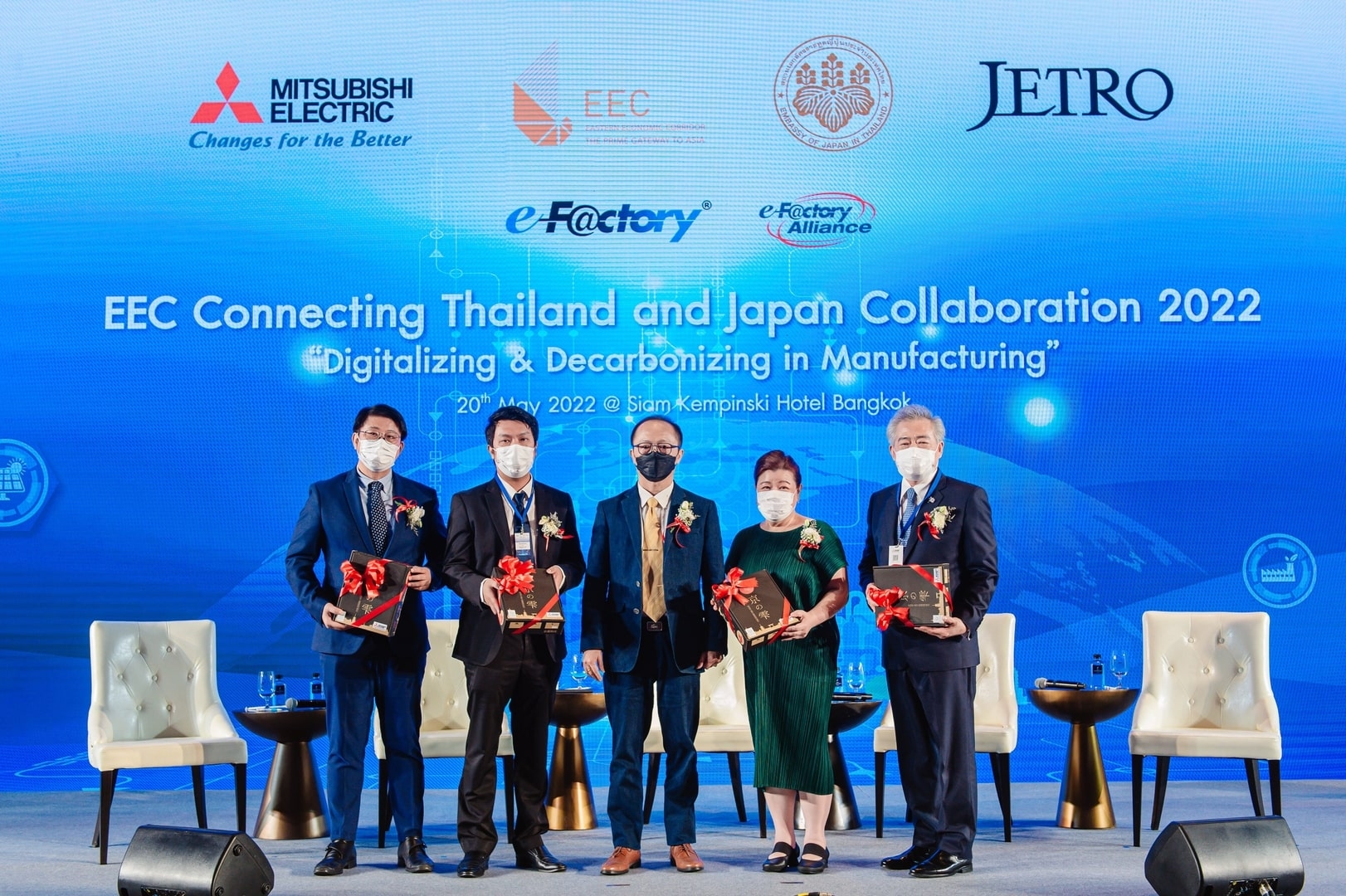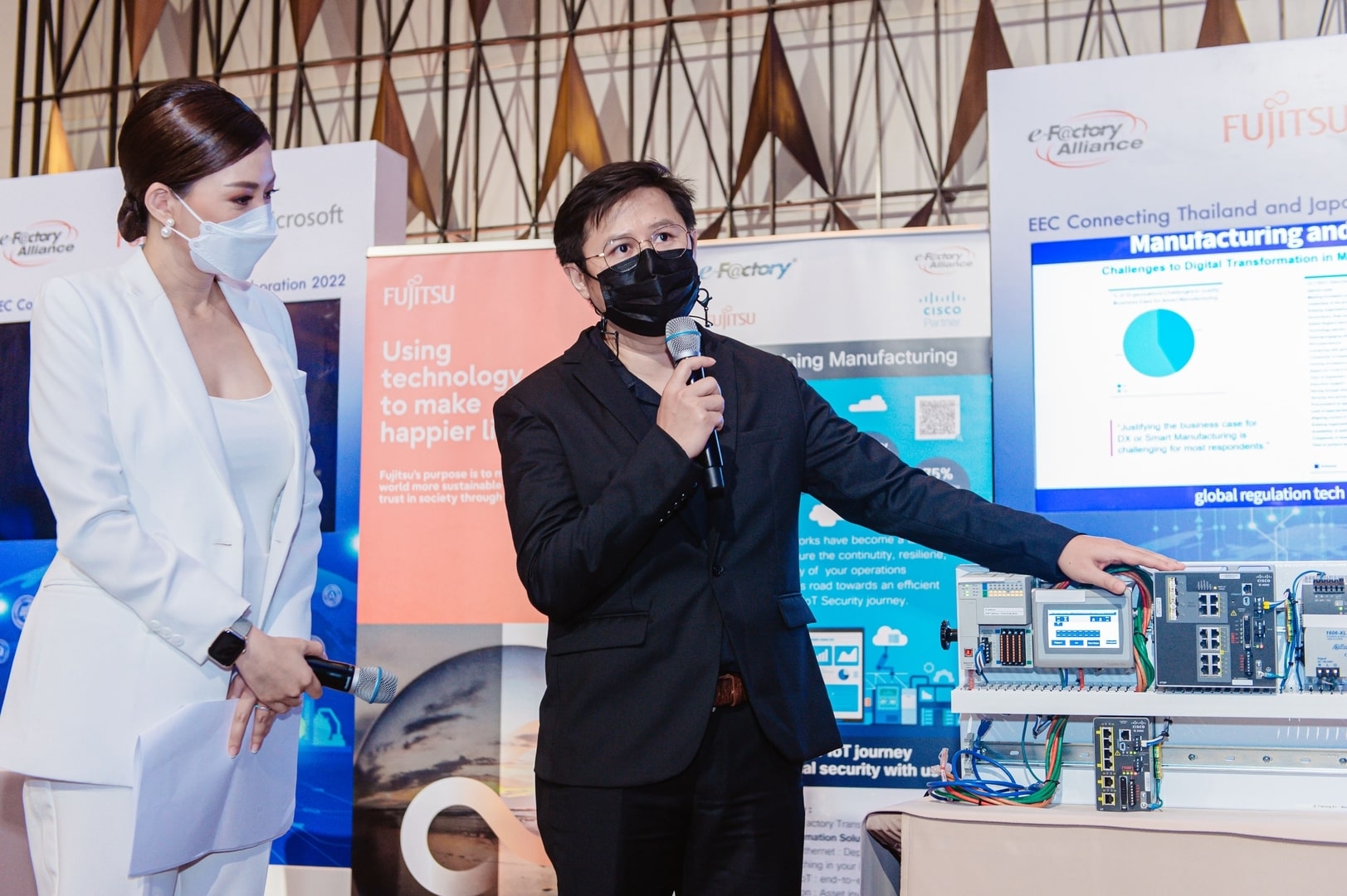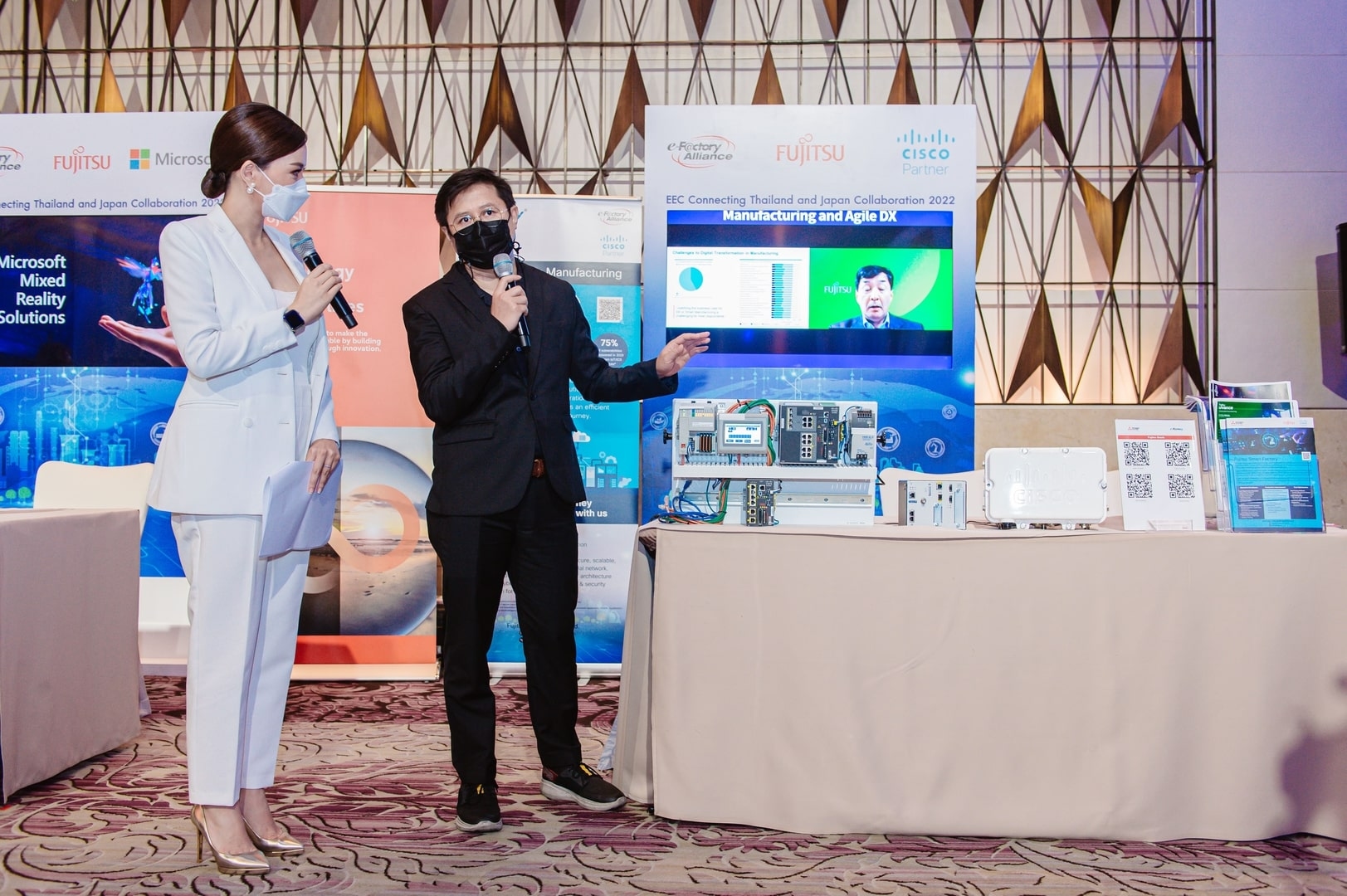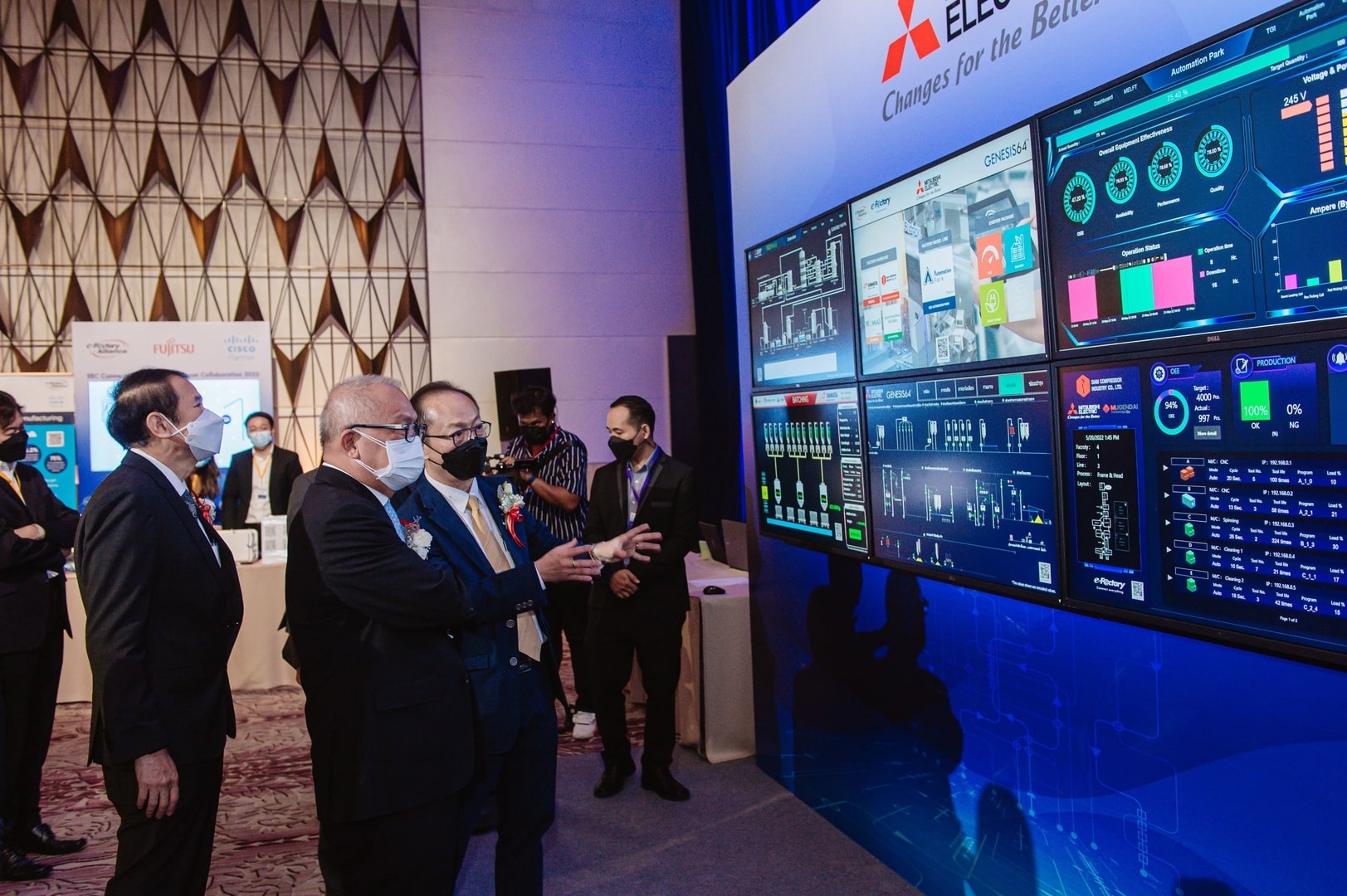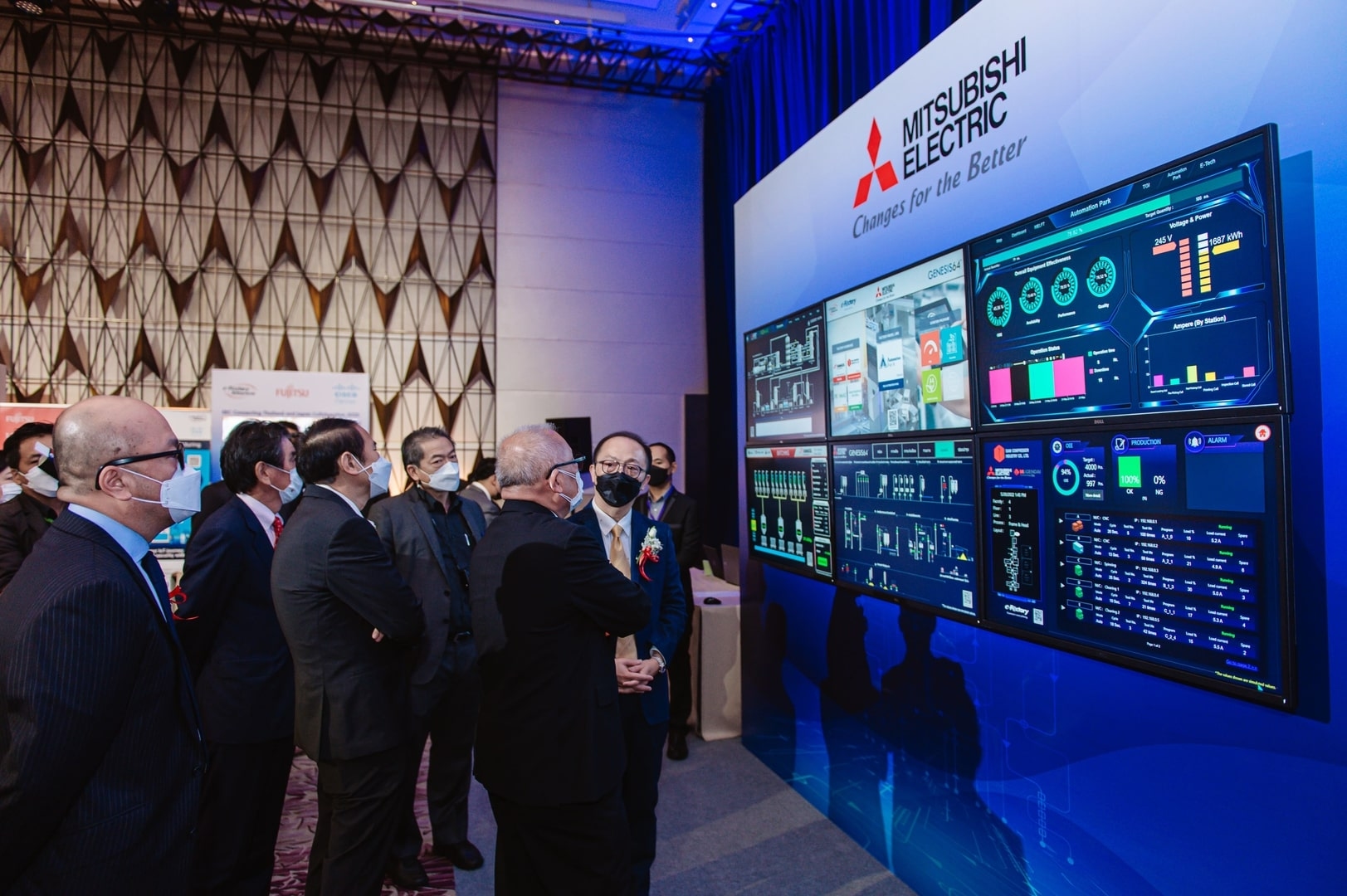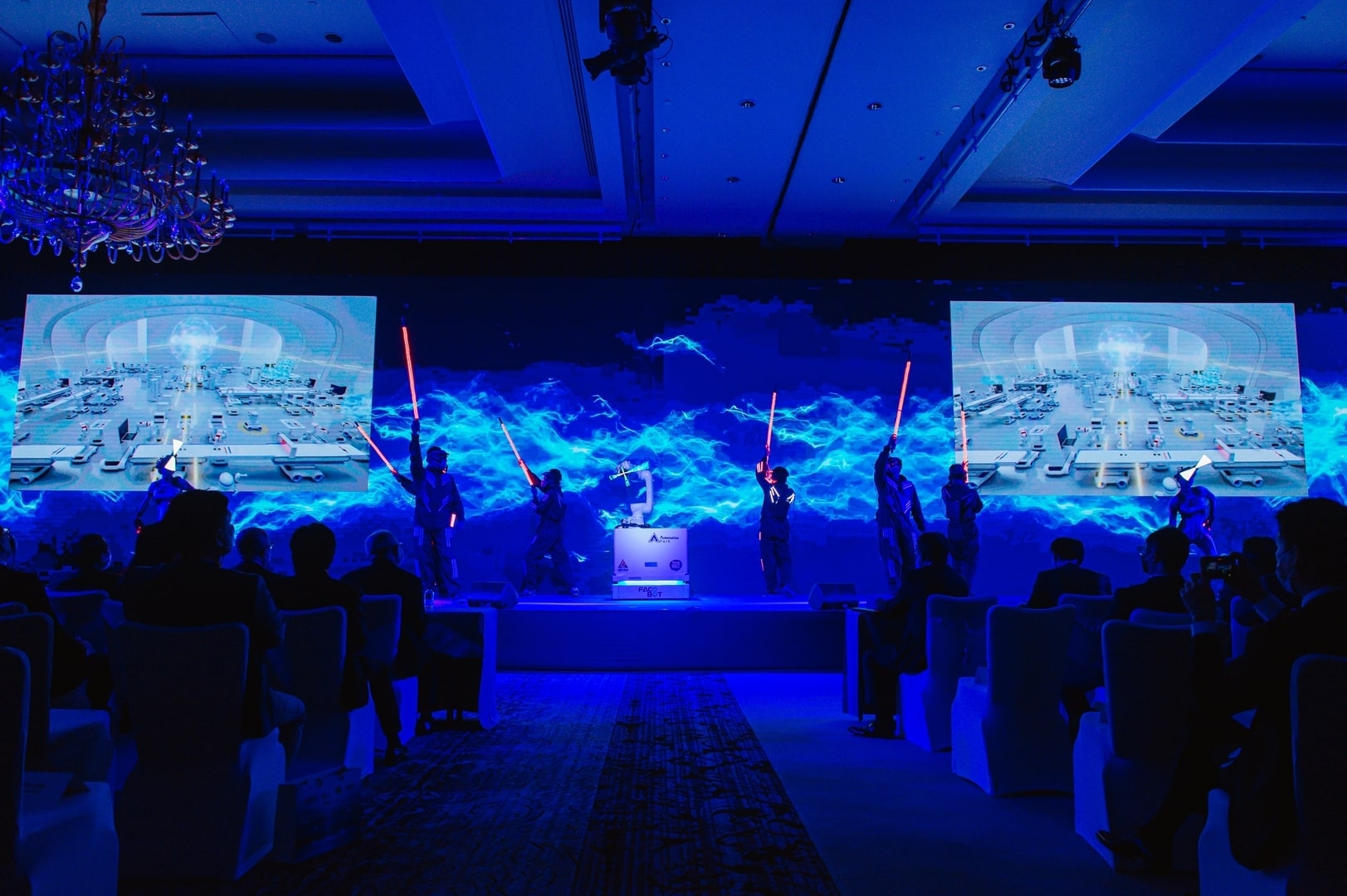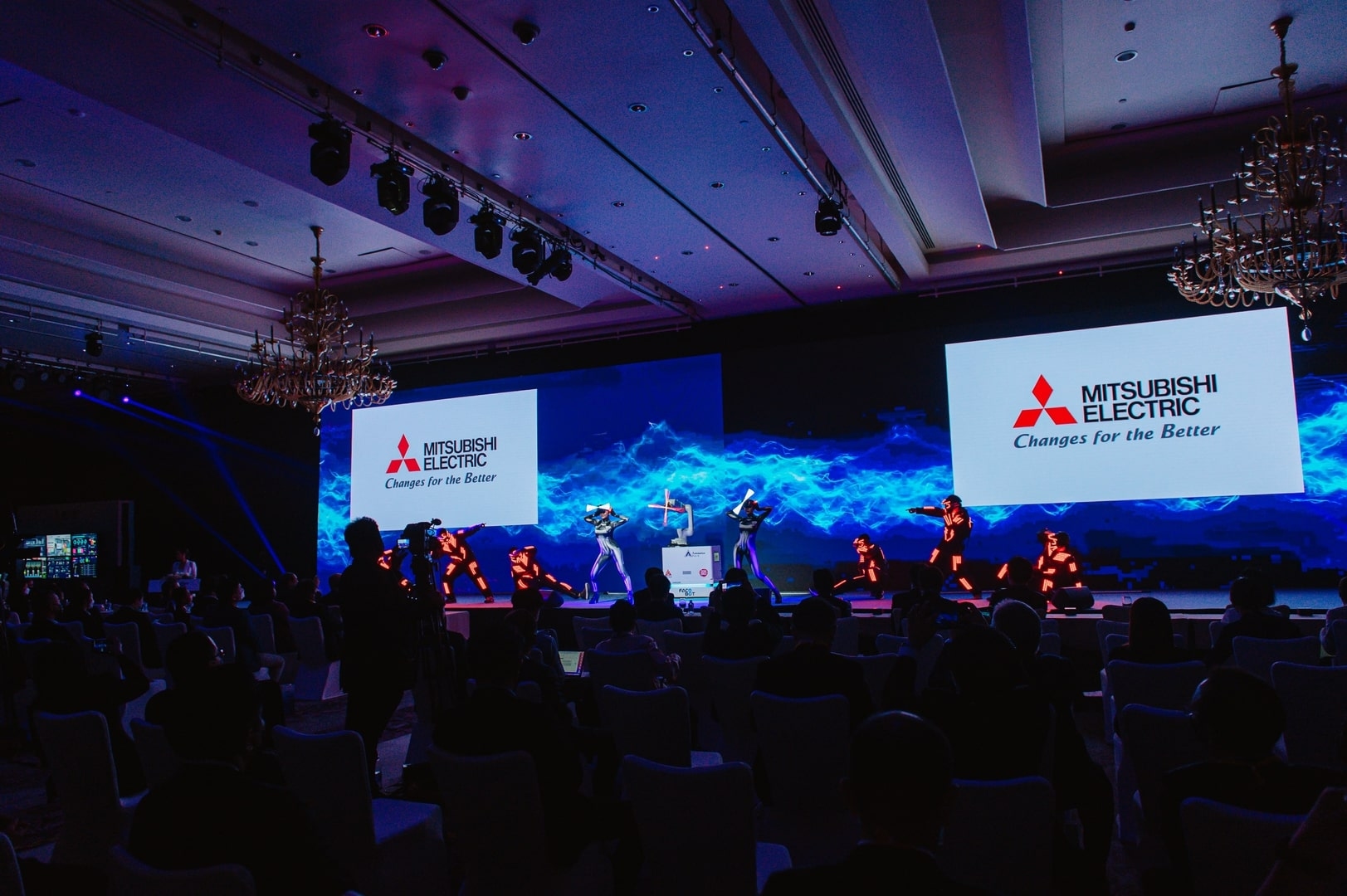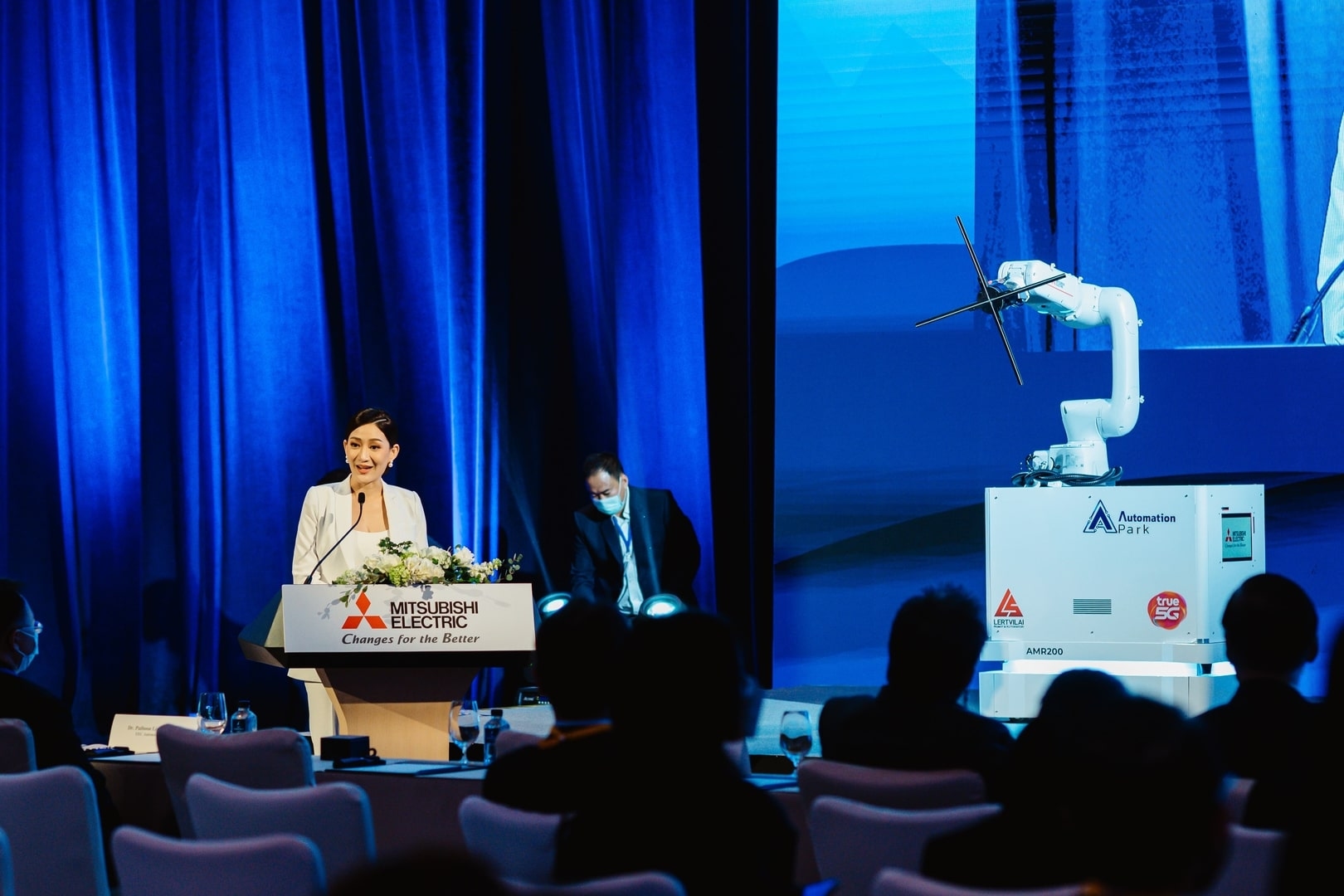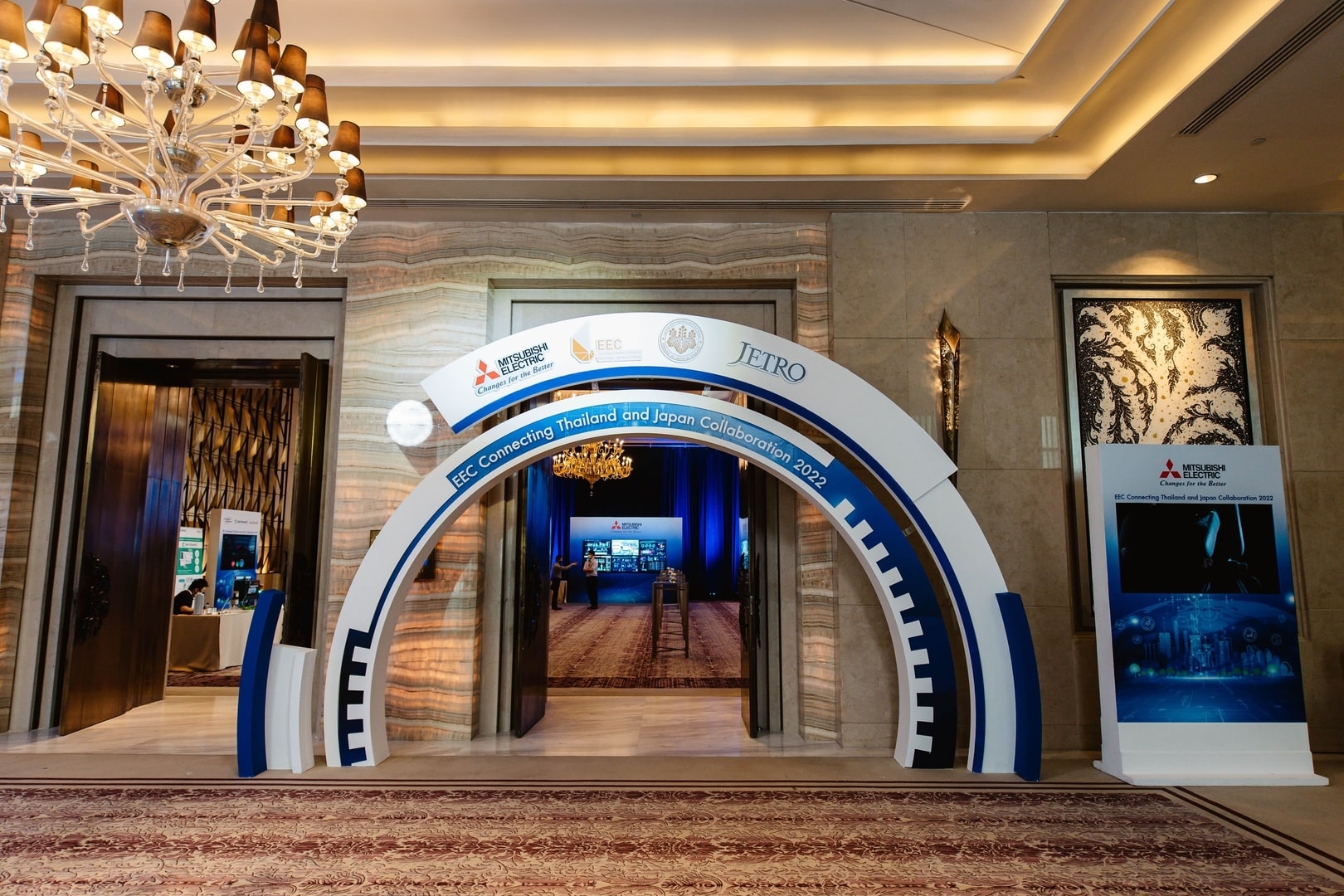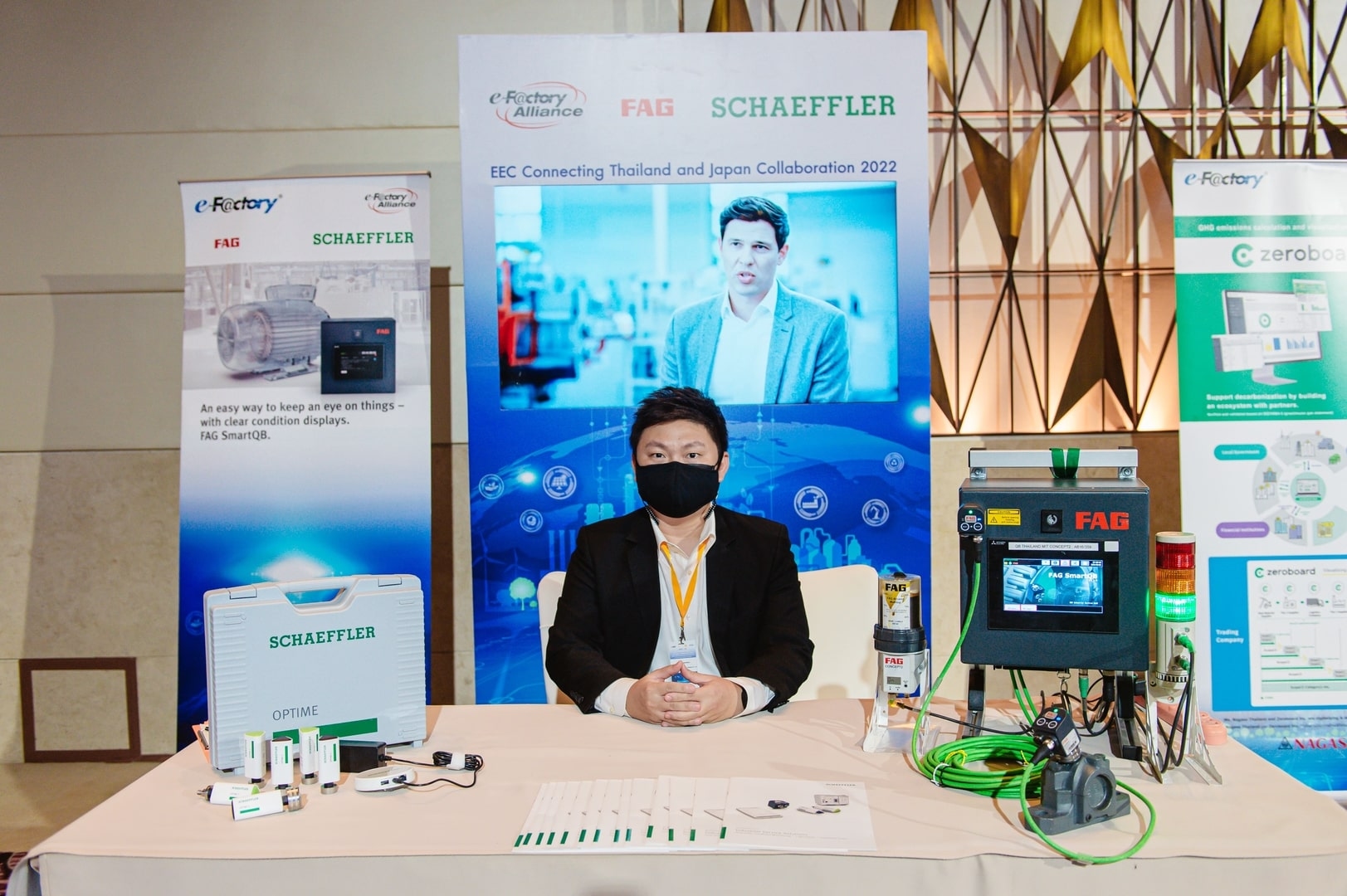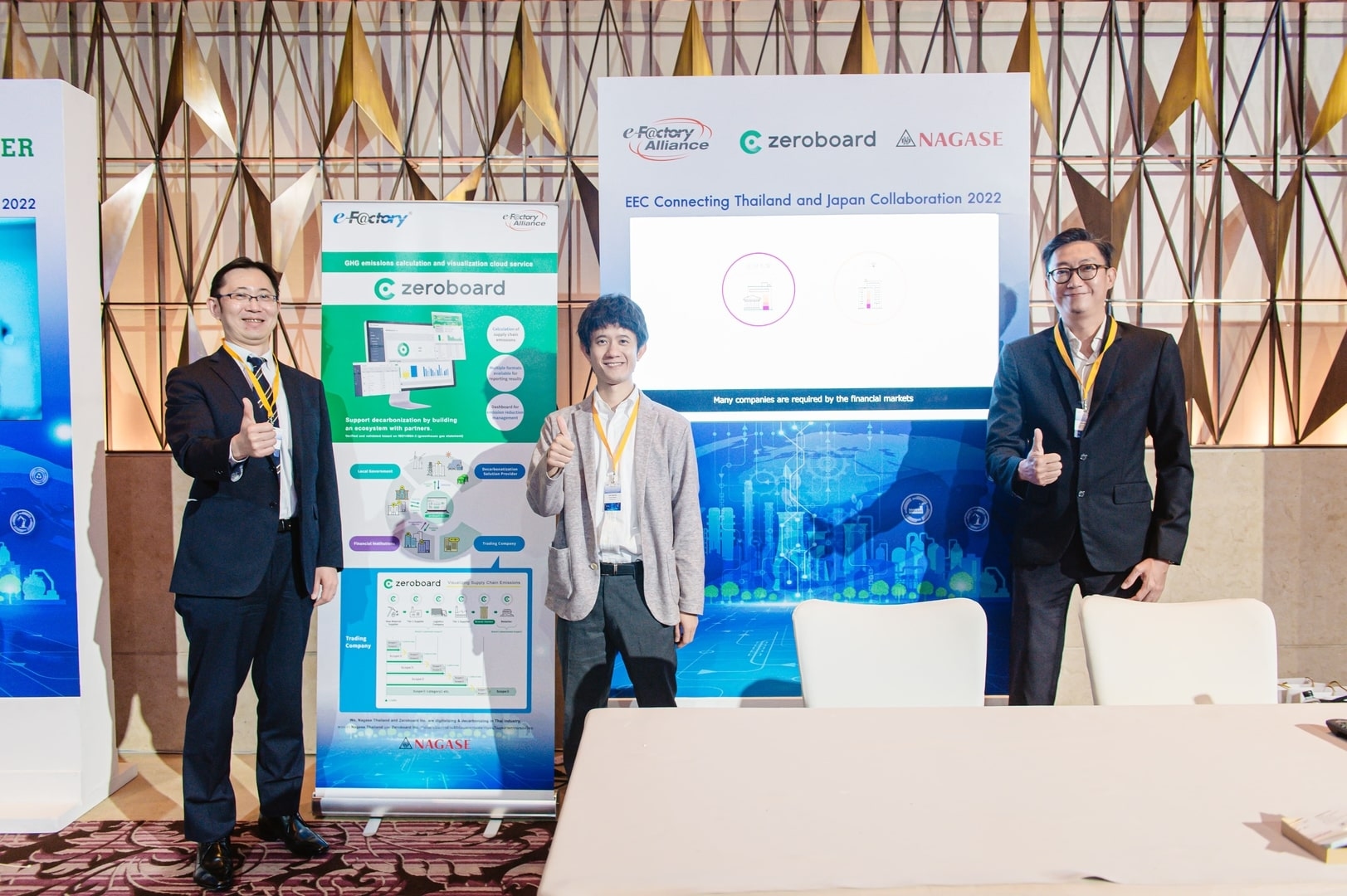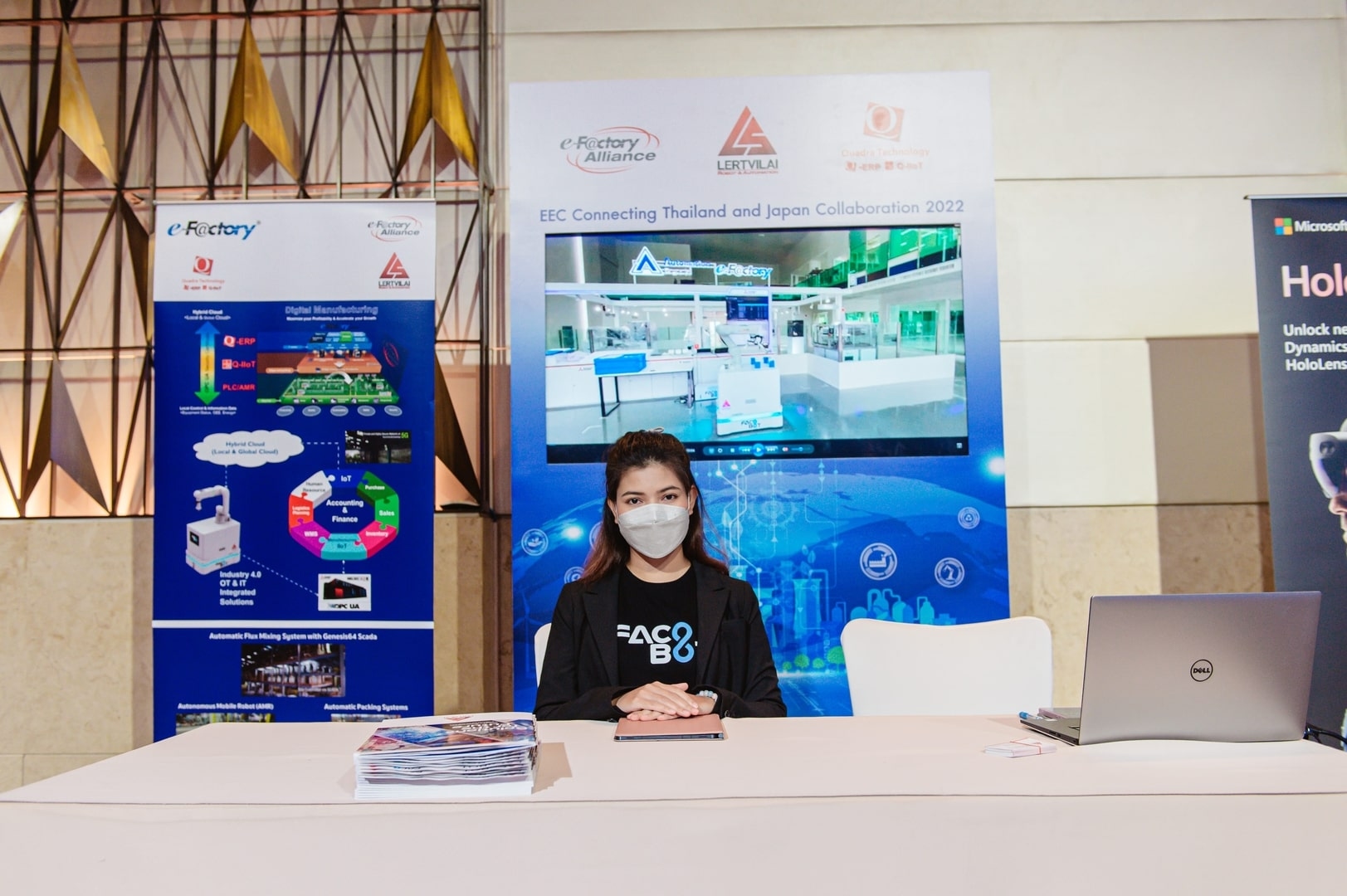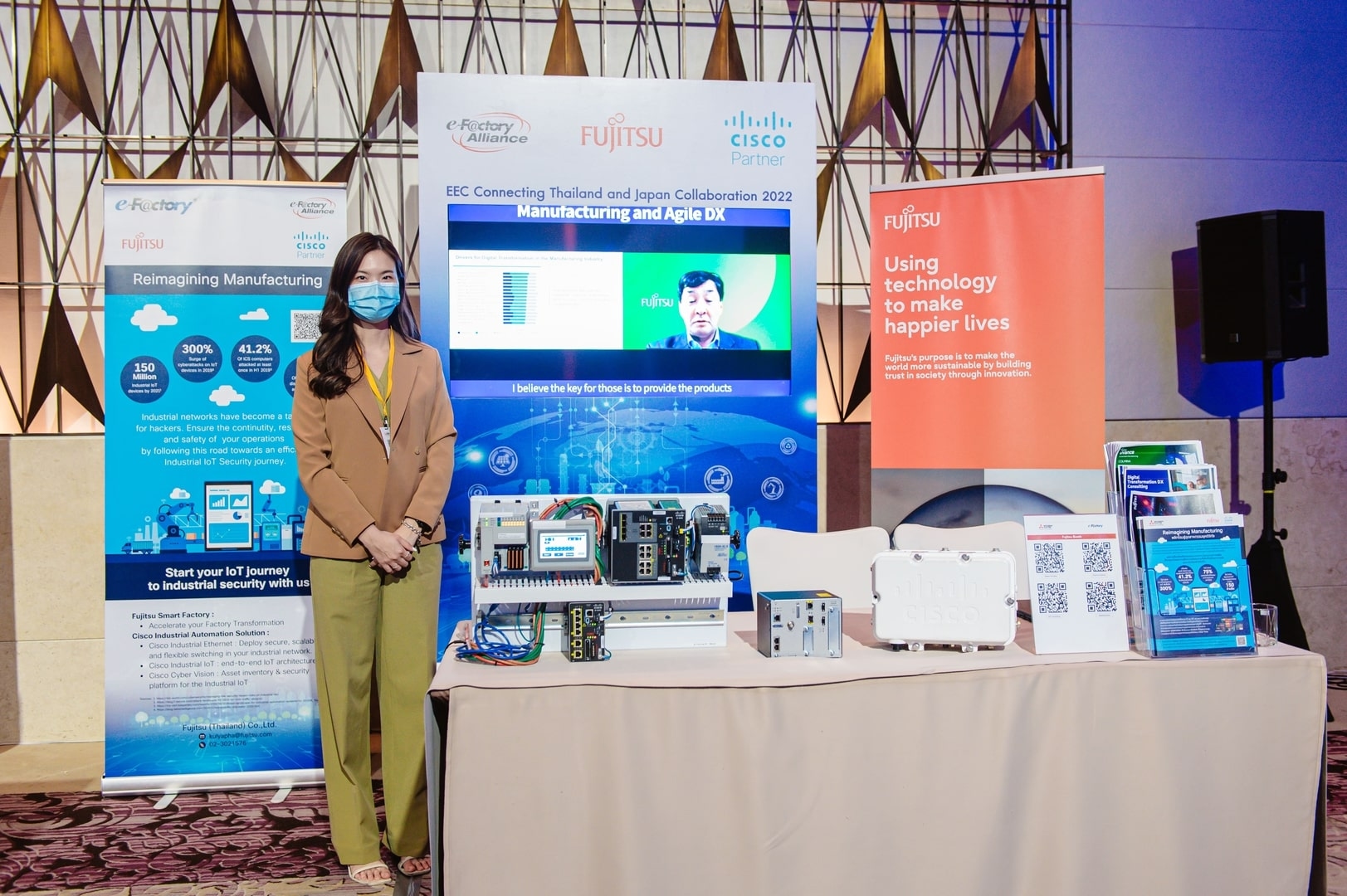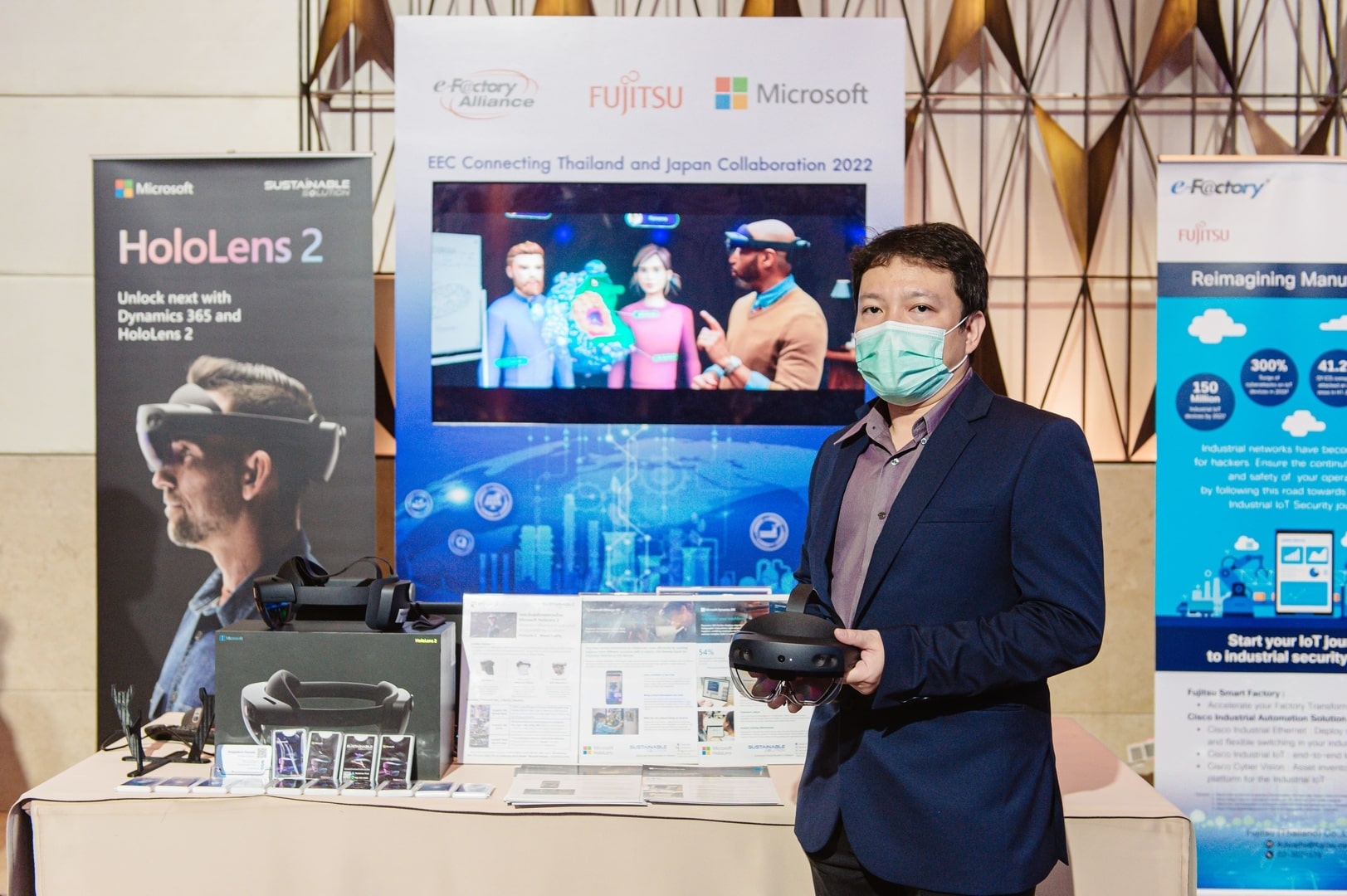Mitsubishi Electric X EEC Announces Success of the Thai-Japan Alliance Elevating Thai Industrial Sector Towards e-F@ctory Automation.
Mitsubishi Electric X EEC Announces Success of the Thai-Japan Alliance
Elevating Thai Industrial Sector Towards e-F@ctory Automation
At the EEC Connecting Thailand and Japan Collaboration Event 2022
Mitsubishi Electric together with the EEC and the Thai-Japan Ecosystem Alliance is organizing the EEC Connecting Thailand and Japan Collaboration 2022 event to announce the success of collaborating with over 60 companies in Thailand and 1,000 companies globally to transfer advanced knowledge and technology to the Thai manufacturing sector. The aim is to upgrade more than 10,000 factories to the e-F@ctory (Industry 4.0 + 5G Utilization) level, and train over 50,000 personnel as a result of no less than THB 50 billion additional investment within 3 years. This will level up EEC as the advanced innovation investment estate to strengthen the Thai economy, increase revenue and improve the quality of life for the Thai people. The project also aims to become carbon-neutral, benefitting from digitalizing and decarbonizing the industry to realize sustainable development. Moreover, this contributes to the concrete achievement of the Thai government’s Thailand Industry 4.0 policy at a faster pace. This hybrid event is well attended in-person and online by over 500 representatives from the government and private sector.
Mr. Supattanapong Punmeechaow, Deputy Prime Minister and Minister of Energy presided over the event and presented the opening remark, “I would like to congratulate upon this success and thank everyone for your kind collaboration between Japan and Thailand. The EEC, as the bridge of this collaboration, while supporting the expansion of the strategic partnership between the two countries. This also marks the occasion of the 135th anniversary of the diplomatic relationships between Thailand and Japan and the 10th anniversary of the Thai-Japan strategic partnership. Our two countries have worked together closely on economic cooperation, integrating the supply chain to drive economic development with the new BCG1 Model and implementing decarbonization for a green society. The partnership promotes innovation and digitalization to foster trade, investment, and industrial development of the future. Collaboration also spans the public health front.”
Despite improving the COVID-19 situation and reopening the borders to overseas visitors, the global inflation triggered by the Russia and Ukraine conflict spurred supply chain disruption in the region. They create obstacles and challenges for the business sector, manufacturing sector, and especially logistics where energy prices fluctuate. The government has deployed several measures to alleviate the burdens in an attempt to stabilize the situation.
Furthermore, the manufacturing industry faces a labor shortage, necessitating the transformation of the manufacturing processes and administration to manage costs, reduce losses, and add value to products and services to remain competitive in the long term. The transformation requires innovations and technologies such as digitalization, 5G connectivity, big data, automation, robotics, and many others. These were implemented at the EEC, in close collaboration with JETRO and the Japanese private sector led by Mitsubishi Electric, a network of technologies, solution providers, and system integrators. These mechanisms are vital to support the transformation of the Thai industrial sector and the drive towards Industry Thailand 4.0 in alignment with the national strategies, and economic & social development plan of Thailand. These developments are also aligned with the Government of Japan’s Investing for the Future and jointly drive the economy and society of this region forward with fine balance and sustainability.”
Mr. Nashida Kazuya, Ambassador of Japan to Thailand, revealed, "Thailand is a highly important partner to Japan with approximately 6,000 companies from Japan choosing to operate in Thailand. Japan remains the leading foreign direct investor in Thailand both in terms of the number of investments and value – with industrial sector investment accounting for around 40% of total investments. This part of our history book can be credited to the close cooperation among Thai and Japanese companies in the manufacturing sector, especially the automotive industry. Taking the main stage in development is the Eastern Economic Corridor (EEC) which is currently entering a new phase with “Digital” and “Green” technological transformation and innovations. The EEC Automation Park led by Mitsubishi Electric located in Burapha University is a fine example of collaboration between the industry and the academic sectors of the 2 countries.
Moreover, Japan is prepared to support Thailand's targets in reducing carbon emissions towards Carbon Neutral within 2050 and greenhouse gas emission to net-zero by 2065. One of the special expertise of Japanese companies in developing products with high energy efficiency and environment-friendly such as hybrid vehicles, eco-cars, and EV batteries in the automotive industry.”
Furthermore, the Government of Japan is proposing “Asia-Japan Investing for Future Initiative: AJIF” aimed at driving the economies of the 2 countries with innovations. The keyword is “Co-Creation": 1) Addressing social issues in each country and proposing effective solutions, 2) Cooperation between government and private sector to utilize private sector innovations in building sustainable economy and society, 3) Jointly design and build the future of the region, through collaboration with companies in partner countries through inclusive and equal synergy.
Meanwhile, Dr. Kanit Sangsubhan, Secretary-General of the Eastern Economic Corridor Office of Thailand (EECO) summarized, “The EEC has continuously developed the Thai-Japan strategic partnership through collaboration with the Japanese government and private sector. This has strengthened the relationships with the Japanese companies in the EEC which in turn strengthened the supply chain collaboration. The collaboration also helps drive the BCG1 model by promoting the application of digital innovations and technology. Cooperation even spans to public health as the improving COVID-19 situation help ease travel. Cooperation frameworks at sub-regional and regional levels were also strengthened such as the Mekong-Japan Cooperation Framework.
The success of our cooperation with Mitsubishi Electric and alliance has built the EEC Automation Park as the knowledge hub for robotics and automation. It encourages the Thai industrial sector to transform into Smart Factory applying manufacturing innovations toward Industry 4.0 in the EEC. We also collaborate with Japan’s Ministry of Economy, Trade, and Industry (METI), Japan External Trade Organization (JETRO), and the Japanese Chamber of Commerce, Bangkok (JCC), to invite Japanese investors to invest and drive the application of robotics and automation. The Institute of Field Robotics (FIBO) at the King Mongkut's University of Technology Thonburi forecasted that within 3 years, Thailand’s digital industry investment will be worth over THB 500 billion. From that, investment in 5G, robotics, and automation in the EEC will be no less than THB 50 billion per year. These will create jobs and livelihood for Thai people and promote the competitiveness of the Thai manufacturing sector in the world arena.
This year, we are targeting no less than 200 factories in the EEC to implement system integration (SI) to achieve smart automation. And within the next 3 years (Year 2025) no less than 6,000 factories, it is expected that no more than 5 years to become smart factories with Digital Manufacturing 4.0 level, at least 10,000 factories. This leveling up with help reduce production costs, lessen machinery downtime, reduce labor intensity, save energy, and upgrade the Thai industrial sector. It also increases our competitiveness in the world market, creates earnings, and improves the quality of life for Thai labor sustainably."
On top of the collaboration to develop digital automation for the industry, Thailand and Japan are also jointly targeting the EEC as the model of Bio-Circular-Green Economy (BCG1 Model). The aim is for the EEC to be the first Net-Zero Emission industrial estate in the region. Mr. Atsushi Taketani, President of the Japan External Trade Organization (JETRO) disclosed about the Thai-Japan collaboration on carbon reduction, “In January 2022, Japan and Thailand have signed a memorandum of understanding to support important bilateral policies such as the BCG1 Economic Model in Thailand, Japanese private investment in Thailand and Japan’s environmentally-friendly growth strategy targeting carbon neutrality.
Digitalization, automation, and lowering labor intensity in manufacturing are the keys to Industry Thailand 4.0 which will place Thailand as a robust global supply chain hub – with the EEC at its heart. In support of this, JETRO has approved several projects such as Automatic Robots, Japan-ASEAN Overseas Supply Chain Creation, and Human Resources Development. In addition, we approved a project on “Asian DX” Promotion where Japanese and ASEAN companies collaboratively demonstrate addressing economic and social issues using digital technologies."
As for Mitsubishi Electric, they have developed the concept of e-F@ctory (Industry 4.0 + 5G model line) and, in collaboration with the alliance, created the EEC Automation Park at Burapha University as the learning center and human resources development center for automation and robotics. The aim is to level up the manufacturing technology in Thailand by incorporating digital (IoT) manufacturing automation with 5G connectivity technology. It also aims to be automation skills development hub for industrial labor, featuring more than 25 curricula.”
Mr. Kotani Tomoaki, Group Vice President, Factory Automation Systems, Mitsubishi Electric Corporation revealed, "In the past several years, the manufacturing industry has digitally transformed globally. This coincides with our vision at Mitsubishi Electric which has been supporting “e-F@ctory manufacturing concept since 2003. This features Factory Automation (FA) and Information Technology (IT) integration in factories to address issues and improve the manufacturing processes and has helped over 40,000 satisfied customers worldwide.
We have established the e-F@ctory Alliance Partner Association with over 1,050 companies globally covering ASEAN, Japan, Taiwan, South Korea, India, Europe, and the USA. In Thailand, we founded the alliance in 2019 and now comprise 60 partner companies. So, we have introduced a new solution under SMKL (Smart Manufacturing Kaizen Level) for presenting a factory management plan on how much IoT systems should be used in factories. In addition, we also ready to support new and prospective clients in automation knowledge and technology.”
Furthermore, the promotion of carbon neutrality has been a major global change in the last few years. This is especially true for automotive manufacturers who are determined to strengthen factory automation and reduce labor intensity in the quest to reduce carbon dioxide (CO2). Mitsubishi Electric is one of the few manufacturers which offer comprehensive carbon reduction solutions and features SCADA software that can monitor the energy usage of each piece of equipment in a factory. The software also monitors carbon emissions and integrates an Eco Advisor. These advantages are highly prized in the carbon-neutral race for automotive manufacturers in Europe.”
As the Government of Thailand established the BCG Economic Model as the national strategy to achieve carbon neutrality by 2050, Mitsubishi Electric is ready to support the industrial sector to promote awareness of this target. This is on top of our role in helping to increase the capacity of human resources in digital technology to drive the manufacturing automation for sustainable growth."
Mr. Wichiene Ngamsukasemsri, Executive Director of Mitsubishi Electric Factory Automation (Thailand) Co., Ltd., which is responsible for all e-F@ctory activities in Thailand concluded by saying, “I wish to thank all of our partners who have collaborated to create an ecosystem which helps expand the cooperation in transferring automation technology to the Thai industrial sector. The technology transfer is comprehensive, comprising hardware, solutions, software, and human resources development to increase human capabilities. The EEC Automation Park is the heart of EEC to drive the Thai economy and the mutual key to the economic future of both countries. And we also target to transform moreover 200 factories to become the smart factories within few years. Although economic growth is the primary objective in implementing and realizing Thailand Industry 4.0, corporate social responsibility is no less important. Therefore, true success is the ability to fulfill target return of investment while achieving low carbon or carbon-neutral society.”
Dr. Apichart Thongyou, Head of the EEC Human Development Center (EEC-HDC), added, "The EEC also collaborates with the Japanese government and private sector on producing personnel required in the advanced innovation industry. The 3-year target is to produce no less than 50,000 personnel through training with a new skill, up-skill, and re-skill in 5G, digital technology, and network. This is facilitated by the EEC Automation Park led by Mitsubishi Electric and their e-F@ctory Alliance Partner Association. So far, more than 1,000 persons have been trained in automation with 2,000 more expected by the end of 2022.”
The EEC Connecting Thailand and Japan Collaboration 2022 event is organized to announce the results of recent achievements and report on the progress of the alliance's contribution to driving the Thai industries. These achievements include support in implementing digital technology in smart manufacturing, the readiness of the EEC Automation Park, and the alliance as a development hub for Industry 4.0. Also achieved is the readiness of the Eastern Economic Corridor Human Resources Development Committee (EEC-HDC) to enable development in human resources automation skills. Furthermore, is the sharing of insights and experiences from manufacturers large and small. Moreover, the event will showcase benefits and incentives available from the government sector to promote digital transformation in the manufacturing sector. Last but not least, a showcase of the latest solutions in Industry 4.0 + 5G technologies.
